#he loves to call me a ‘’free radical’’ so whenever i do something ~Traditional~ he feigns shock and awe
Explore tagged Tumblr posts
Text
realized my dad can’t be mad about me choosing a different last name for marriage because as his “daughter” he should have expected/accepted that from day 1
#he loves to call me a ‘’free radical’’ so whenever i do something ~Traditional~ he feigns shock and awe#’’you’re such a free radical i didn’t expect YOU to respect the sanctity of [something thats usually not that sanctious hes just as asshole]#imagine being a republican and using the word ‘’free’’ in your diminutive namecalling
2 notes
·
View notes
Photo

4th March >> Fr. Martin's Gospel Reflections / Homilies on Mark 10:17-27 for Monday, Eighth Week in Ordinary Time: ‘What must I do to inherit eternal life?’.
Monday, Eighth Week in Ordinary Time
Gospel (Europe, Africa, New Zealand, Australia & Canada)
Mark 10:17-27
Give everything you own to the poor, and follow me
Jesus was setting out on a journey when a man ran up, knelt before him and put this question to him, ‘Good master, what must I do to inherit eternal life?’ Jesus said to him, ‘Why do you call me good? No one is good but God alone. You know the commandments: You must not kill; You must not commit adultery; You must not steal; You must not bring false witness; You must not defraud; Honour your father and mother.’ And he said to him, ‘Master, I have kept all these from my earliest days.’ Jesus looked steadily at him and loved him, and he said, ‘There is one thing you lack. Go and sell everything you own and give the money to the poor, and you will have treasure in heaven; then come, follow me.’ But his face fell at these words and he went away sad, for he was a man of great wealth.
Jesus looked round and said to his disciples, ‘How hard it is for those who have riches to enter the kingdom of God!’ The disciples were astounded by these words, but Jesus insisted, ‘My children,’ he said to them ‘how hard it is to enter the kingdom of God! It is easier for a camel to pass through the eye of a needle than for a rich man to enter the kingdom of God.’ They were more astonished than ever. ‘In that case’ they said to one another ‘who can be saved?’ Jesus gazed at them. ‘For men’ he said ‘it is impossible, but not for God: because everything is possible for God.’
Gospel (USA)
Mark 10:17-27
Go, sell what you have, and give to the poor.
As Jesus was setting out on a journey, a man ran up, knelt down before him, and asked him, “Good teacher, what must I do to inherit eternal life?” Jesus answered him, “Why do you call me good? No one is good but God alone. You know the commandments: You shall not kill; you shall not commit adultery; you shall not steal; you shall not bear false witness; you shall not defraud; honor your father and your mother.” He replied and said to him, “Teacher, all of these I have observed from my youth.” Jesus, looking at him, loved him and said to him, “You are lacking in one thing. Go, sell what you have, and give to the poor and you will have treasure in heaven; then come, follow me.” At that statement, his face fell, and he went away sad, for he had many possessions.
Jesus looked around and said to his disciples, “How hard it is for those who have wealth to enter the Kingdom of God!” The disciples were amazed at his words. So Jesus again said to them in reply, “Children, how hard it is to enter the Kingdom of God! It is easier for a camel to pass through the eye of a needle than for one who is rich to enter the Kingdom of God.” They were exceedingly astonished and said among themselves, “Then who can be saved?” Jesus looked at them and said, “For men it is impossible, but not for God. All things are possible for God.”
Reflections (7)
(i) Monday, Eighth Week in Ordinary Time
The opening words of Jesus’ reply to the rich man in today’s gospel reading has always intrigued me. The man addressed Jesus as ‘Good master’, and in reply Jesus says to him, ‘Why do you call me good? No one is good but God alone’. Jesus seems to be saying that not even he can fully express the goodness that is God. Yet, we believe that Jesus is the fullest revelation of God’s goodness possible in a human life. On the basis of what Jesus says, we would have to hold that there is even more to God’s goodness than Jesus has revealed. If Jesus is the fullest revelation of God’s goodness in a human life, we are all called to reveal something of God’s goodness in our own lives. The man who ran up to Jesus with his burning question was clearly a good man. He declared to Jesus that he had kept all of God’s commandments that Jesus quoted from his earliest days. The commandments Jesus quoted concern how we relate to others; they are the second section of the ten commandments. The first section of the ten commandments concern how we relate to God, the very first being that we should have no other god than the Lord God. This is where the man left something to be desired. He was very attached to his wealth; he served his wealth; it had become something of a god for him; he couldn’t leave it when Jesus asked him to. Jesus saw his predicament as one we are all prone to. That is why Jesus turned to his disciples after the man left to warn them of the powerful attraction of possessions, of wealth. The first commandment is perhaps the hardest of all to live by. We are all prone to allowing something less than the one, true God to become god in our lives.
And/Or
(ii) Monday, Eighth Week in Ordinary Time
Sometimes when we ask a question, we can find the answer to our question difficult to come to terms with. That is the case with the rich man who ran up to Jesus in this morning’s gospel with the question, ‘What must I do to inherit eternal life?’ When Jesus asked him to go beyond the Ten Commandments he had been keeping and to sell all he owned and follow Jesus along the way, he couldn’t live with that answer. We are told that he walked away sad. Jesus did not ask everybody he met to sell everything and to journey with him, but he did ask this man. This was this man’s particular calling. Like this man, we can often find ourselves faced with a call to do something which seems beyond us. The temptation can be to walk away from the call, even though to say ‘yes’ to the call would be the path to life for us. The Lord can call any one of us beyond where we are; he can call on us to grow in our relationship with him, to be more generous in our response to his presence. We may not be able to answer that call in our own strength, but we will be able to answer it with the Lord’s strength. In the gospel reading, Jesus declares that ‘everything is possible for God’. When Mary was called to become the mother of Jesus and she hesitated,that was the message she heard. The angel declared to her ‘Nothing will be impossible with God’. It is the message we too will hear whenever we seek to answer the Lord’s very particular call to each of us.
And/Or
(iii) Monday, Eighth Week in Ordinary Time
There is a contrast in the gospel reading between the excited running of the man to Jesus and the sad walk of that same man away from Jesus. His excited running was motivated by the burning question that he wanted to ask Jesus, ‘What must I do to inherit eternal life?’ His sad walk away from Jesus resulted from his inability to live with the answer that Jesus gave to his question, ‘Go and sell everything you own and give the money to the poor… then come, follow me’. Not everyone whom Jesus encountered was called in this particular way. Some of those whom Jesus healed, for example, were told to return to their village and their home. However, the call to sell everything and follow Jesus in a very radical way was this particular man’s call and he was unable to answer it, because he was not free in himself. He was tied to his wealth; his possessions possessed him. We all have our own particular call from the Lord, although it will most likely take a different form to this man’s call. That call from the Lord which is unique to each of us is not just a once off call but a daily call. This morning’s gospel reminds us of the need to keep growing in the freedom to answer the Lord’s call, so that we are not held back from responding to it by our excessive attachments, whatever form they may take.
And/Or
(iv) Monday, Eighth Week in Ordinary Time
The story of the rich man and Jesus is full of emotion. We are told that the man ran up to Jesus to ask his burning question, ‘What must I do to inherit eternal life?’ It is said of Jesus that he looked steadily at him and loved him. When the man could not respond to the call of Jesus he went away sad. In the space of a short exchange the man’s lively enthusiasm gave way to great sadness. Jesus’ love for this man could not win his heart. The man’s heart was wrapped up in his possessions and Jesus was helpless to do anything about it at the time. It is a reminder to us that Jesus needs our co-operation if his purpose for our lives is to come to pass. He calls but he cannot force a response, anymore than he could force the response of the idealistic man who had run up to him with such energy. The story reminds us that following Jesus will often mean letting go of something that we are holding onto for dear life. We may struggle to let go of what we need to let go of; it may seem impossible to do so at times, but we have the reassuring words of Jesus to the disciples after the rich man had left, ‘everything is possible for God’. With God’s grace we can do the seemingly impossible.
And/Or
(v) Monday, Eighth week in Ordinary Time
We all ask questions in the course of a week, even a day. Most of these questions get answered and we move on from them. However, there are other bigger questions in life that remain with us all our lives. We never get a full answer to them. These are questions that keep us seeking and asking. We find one of these big questions on the lips of the man who approached Jesus in today’s gospel reading, ‘What must I do to inherit eternal life?’ He was asking, ‘What is the path of life that I need to take?’ It is a question we can all identify with, because it remains our question. It is a fundamental human question. In response to his question, Jesus directs him to the core teaching of his own Jewish religious tradition, in particular, to the ten commandments, quoting six of those commandments. Our own religious tradition is the first place we often turn to in trying to answer the big questions of life. It is the search for the answer to the big questions of life that has given rise to the various religious traditions in the world. Our own religious tradition has the capacity to speak to each one of us in a very personal way. After quoting the tradition, Jesus then spoke to this man in a very personal way; he gave him a very personal calling on the basis of that tradition, ‘Sell everything you own... then, come, follow me’. Jesus did not insist that everyone who followed him should sell everything they owned. Mary and Martha who provided hospitality for Jesus were certainly among his followers but it seems they were not asked to sell their home. The Lord’s general call to us from our religious tradition takes on a very personal form for each one of us. Within the broad path we are all called to take, the Lord has a very particular path for each of us. In so far as we try to listen for that very personal call and try to respond to it we will find that path of life which the man in the gospel was looking for and we are all seeking.
And/Or
(vi) Monday, Eighth Week in Ordinary Time
Several people ask questions of Jesus in the course of the gospels, many of which are very significant. One of the most important questions asked of Jesus is to be found on the lips of the rich man in today’s gospel reading, ‘What must I do to inherit eternal life?’ Here was a man whose perspective was not confined to this life only. He understood well that this earthly life was not the whole of reality. In response to his question, Jesus quoted the Ten Commandments. Jesus was saying to him that these Ten Commandments are the path to eternal life. That answer of Jesus remains valid for us today. However, we look to the life of Jesus to show us what it means to live the Ten Commandments to the full. The rich man wasn’t satisfied with Jesus’ answer; he felt called to something more. However, when Jesus put the more before him, he backed away from it. Like the rich man we too can experience within ourselves a desire to go beyond what is strictly necessary and required. As we struggle at time to give expression to that desire we draw strength from the final words of Jesus in today’s gospel reading, ‘for God all thinks are possible’.
And/Or
(vii) Monday, Eighth Week in Ordinary Time
In the gospel reading a man of great wealth runs up to Jesus with a burning question, ‘What must I do to inherit eternal life?’ Here was someone who clearly wanted to take the path of life, God’s path that leads to eternal life. He subsequently declares to Jesus that he has kept God’s commandments since his earliest days. He has been serious about his faith life, since his early youth. He was a good man who wanted to be better. He seems to have made an impact on Jesus. The gospel reading declares that ‘Jesus looked steadily at him and loved him’. Jesus looks steadily at all of us and loves us as we struggle to take the path of life that God is calling us to take. It was out of his love for this man that Jesus now invites him to take another step on his faith journey, a more generous and demanding step. Jesus calls him to walk away from his great wealth and to follow him as a disciple on the road to Jerusalem. Jesus knew that this was the path that would be truly life giving for this man. Yet, it proved a step too far for him. In response to Jesus’ call, we are told that ‘he went away sad’. It is one of the saddest verses in the gospels. It is because the Lord loves us that he is always calling us to take that extra step in our relationship with him. Like the man in the gospel, we too can hesitate to take that extra, more generous, more demanding, step on our journey of faith. We may feel it is more than we are able for. Yet, if we take the step the Lord is calling us to take, God will be our help and our strength. In the power of God’s help and strength we will be able to do what we cannot do on our own. As Jesus declares at the end of the gospel reading, ‘Everything is possible for God’.
Fr. Martin Hogan, Saint John the Baptist Parish, Clontarf, Dublin, D03 AO62, Ireland.
Email: [email protected] or [email protected]
Parish Website: www.stjohnsclontarf.ie Please join us via our webcam.
Twitter: @SJtBClontarfRC.
Facebook: St John the Baptist RC Parish, Clontarf.
Tumblr: Saint John the Baptist Parish, Clontarf, Dublin
2 notes
·
View notes
Photo

28th May >> Fr. Martin's Gospel Reflections / Homilies on Mark 10:17-27 for Monday, Eighth Week in Ordinary Time: ‘He went away sad’.
Monday, Eighth Week in Ordinary Time
Gospel (Europe, Africa, New Zealand, Australia & Canada)
Mark 10:17-27
Give everything you own to the poor, and follow me
Jesus was setting out on a journey when a man ran up, knelt before him and put this question to him, ‘Good master, what must I do to inherit eternal life?’ Jesus said to him, ‘Why do you call me good? No one is good but God alone. You know the commandments: You must not kill; You must not commit adultery; You must not steal; You must not bring false witness; You must not defraud; Honour your father and mother.’ And he said to him, ‘Master, I have kept all these from my earliest days.’ Jesus looked steadily at him and loved him, and he said, ‘There is one thing you lack. Go and sell everything you own and give the money to the poor, and you will have treasure in heaven; then come, follow me.’ But his face fell at these words and he went away sad, for he was a man of great wealth.
Jesus looked round and said to his disciples, ‘How hard it is for those who have riches to enter the kingdom of God!’ The disciples were astounded by these words, but Jesus insisted, ‘My children,’ he said to them ‘how hard it is to enter the kingdom of God! It is easier for a camel to pass through the eye of a needle than for a rich man to enter the kingdom of God.’ They were more astonished than ever. ‘In that case’ they said to one another ‘who can be saved?’ Jesus gazed at them. ‘For men’ he said ‘it is impossible, but not for God: because everything is possible for God.’
Gospel (USA)
Mark 10:17-27
Go, sell what you have, and give to the poor.
As Jesus was setting out on a journey, a man ran up, knelt down before him, and asked him, “Good teacher, what must I do to inherit eternal life?” Jesus answered him, “Why do you call me good? No one is good but God alone. You know the commandments: You shall not kill; you shall not commit adultery; you shall not steal; you shall not bear false witness; you shall not defraud; honor your father and your mother.” He replied and said to him, “Teacher, all of these I have observed from my youth.” Jesus, looking at him, loved him and said to him, “You are lacking in one thing. Go, sell what you have, and give to the poor and you will have treasure in heaven; then come, follow me.” At that statement, his face fell, and he went away sad, for he had many possessions.
Jesus looked around and said to his disciples, “How hard it is for those who have wealth to enter the Kingdom of God!” The disciples were amazed at his words. So Jesus again said to them in reply, “Children, how hard it is to enter the Kingdom of God! It is easier for a camel to pass through the eye of a needle than for one who is rich to enter the Kingdom of God.” They were exceedingly astonished and said among themselves, “Then who can be saved?” Jesus looked at them and said, “For men it is impossible, but not for God. All things are possible for God.”
Reflections (7)
(i) Monday, Eighth Week in Ordinary Time
The opening words of Jesus’ reply to the rich man in today’s gospel reading has always intrigued me. The man addressed Jesus as ‘Good master’, and in reply Jesus says to him, ‘Why do you call me good? No one is good but God alone’. Jesus seems to be saying that not even he can fully express the goodness that is God. Yet, we believe that Jesus is the fullest revelation of God’s goodness possible in a human life. On the basis of what Jesus says, we would have to hold that there is even more to God’s goodness than Jesus has revealed. If Jesus is the fullest revelation of God’s goodness in a human life, we are all called to reveal something of God���s goodness in our own lives. The man who ran up to Jesus with his burning question was clearly a good man. He declared to Jesus that he had kept all of God’s commandments that Jesus quoted from his earliest days. The commandments Jesus quoted concern how we relate to others; they are the second section of the ten commandments. The first section of the ten commandments concern how we relate to God, the very first being that we should have no other god than the Lord God. This is where the man left something to be desired. He was very attached to his wealth; he served his wealth; it had become something of a god for him; he couldn’t leave it when Jesus asked him to. Jesus say his predicament as one we are all prone to. That is why Jesus turned to his disciples after the man left to warn them of the powerful attraction of possessions, of wealth. The first commandment is perhaps the hardest of all to live by. We are all prone to allowing something less than the one, true God to become god in our lives.
And/Or
(ii) Monday, Eighth Week in Ordinary Time
Sometimes when we ask a question, we can find the answer to our question difficult to come to terms with. That is the case with the rich man who ran up to Jesus in this morning’s gospel with the question, ‘What must I do to inherit eternal life?’ When Jesus asked him to go beyond the Ten Commandments he had been keeping and to sell all he owned and follow Jesus along the way, he couldn’t live with that answer. We are told that he walked away sad. Jesus did not ask everybody he met to sell everything and to journey with him, but he did ask this man. This was this man’s particular calling. Like this man, we can often find ourselves faced with a call to do something which seems beyond us. The temptation can be to walk away from the call, even though to say ‘yes’ to the call would be the path to life for us. The Lord can call any one of us beyond where we are; he can call on us to grow in our relationship with him, to be more generous in our response to his presence. We may not be able to answer that call in our own strength, but we will be able to answer it with the Lord’s strength. In the gospel reading, Jesus declares that ‘everything is possible for God’. When Mary was called to become the mother of Jesus and she hesitated,that was the message she heard. The angel declared to her ‘Nothing will be impossible with God’. It is the message we too will hear whenever we seek to answer the Lord’s very particular call to each of us.
And/Or
(iii) Monday, Eighth Week in Ordinary Time
There is a contrast in the gospel reading between the excited running of the man to Jesus and the sad walk of that same man away from Jesus. His excited running was motivated by the burning question that he wanted to ask Jesus, ‘What must I do to inherit eternal life?’ His sad walk away from Jesus resulted from his inability to live with the answer that Jesus gave to his question, ‘Go and sell everything you own and give the money to the poor… then come, follow me’. Not everyone whom Jesus encountered was called in this particular way. Some of those whom Jesus healed, for example, were told to return to their village and their home. However, the call to sell everything and follow Jesus in a very radical way was this particular man’s call and he was unable to answer it, because he was not free in himself. He was tied to his wealth; his possessions possessed him. We all have our own particular call from the Lord, although it will most likely take a different form to this man’s call. That call from the Lord which is unique to each of us is not just a once off call but a daily call. This morning’s gospel reminds us of the need to keep growing in the freedom to answer the Lord’s call, so that we are not held back from responding to it by our excessive attachments, whatever form they may take.
And/Or
(iv) Monday, Eighth Week in Ordinary Time
The story of the rich man and Jesus is full of emotion. We are told that the man ran up to Jesus to ask his burning question, ‘What must I do to inherit eternal life?’ It is said of Jesus that he looked steadily at him and loved him. When the man could not respond to the call of Jesus he went away sad. In the space of a short exchange the man’s lively enthusiasm gave way to great sadness. Jesus’ love for this man could not win his heart. The man’s heart was wrapped up in his possessions and Jesus was helpless to do anything about it at the time. It is a reminder to us that Jesus needs our co-operation if his purpose for our lives is to come to pass. He calls but he cannot force a response, anymore than he could force the response of the idealistic man who had run up to him with such energy. The story reminds us that following Jesus will often mean letting go of something that we are holding onto for dear life. We may struggle to let go of what we need to let go of; it may seem impossible to do so at times, but we have the reassuring words of Jesus to the disciples after the rich man had left, ‘everything is possible for God’. With God’s grace we can do the seemingly impossible.
And/Or
(v) Monday, Eighth week in Ordinary Time
We all ask questions in the course of a week, even a day. Most of these questions get answered and we move on from them. However, there are other bigger questions in life that remain with us all our lives. We never get a full answer to them. These are questions that keep us seeking and asking. We find one of these big questions on the lips of the man who approached Jesus in today’s gospel reading, ‘What must I do to inherit eternal life?’ He was asking, ‘What is the path of life that I need to take?’ It is a question we can all identify with, because it remains our question. It is a fundamental human question. In response to his question, Jesus directs him to the core teaching of his own Jewish religious tradition, in particular, to the ten commandments, quoting six of those commandments. Our own religious tradition is the first place we often turn to in trying to answer the big questions of life. It is the search for the answer to the big questions of life that has given rise to the various religious traditions in the world. Our own religious tradition has the capacity to speak to each one of us in a very personal way. After quoting the tradition, Jesus then spoke to this man in a very personal way; he gave him a very personal calling on the basis of that tradition, ‘Sell everything you own... then, come, follow me’. Jesus did not insist that everyone who followed him should sell everything they owned. Mary and Martha who provided hospitality for Jesus were certainly among his followers but it seems they were not asked to sell their home. The Lord’s general call to us from our religious tradition takes on a very personal form for each one of us. Within the broad path we are all called to take, the Lord has a very particular path for each of us. In so far as we try to listen for that very personal call and try to respond to it we will find that path of life which the man in the gospel was looking for and we are all seeking.
And/Or
(vi) Monday, Eighth Week in Ordinary Time
Several people ask questions of Jesus in the course of the gospels, many of which are very significant. One of the most important questions asked of Jesus is to be found on the lips of the rich man in today’s gospel reading, ‘What must I do to inherit eternal life?’ Here was a man whose perspective was not confined to this life only. He understood well that this earthly life was not the whole of reality. In response to his question, Jesus quoted the Ten Commandments. Jesus was saying to him that these Ten Commandments are the path to eternal life. That answer of Jesus remains valid for us today. However, we look to the life of Jesus to show us what it means to live the Ten Commandments to the full. The rich man wasn’t satisfied with Jesus’ answer; he felt called to something more. However, when Jesus put the more before him, he backed away from it. Like the rich man we too can experience within ourselves a desire to go beyond what is strictly necessary and required. As we struggle at time to give expression to that desire we draw strength from the final words of Jesus in today’s gospel reading, ‘for God all thinks are possible’.
And/Or
(vii) Monday, Eighth Week in Ordinary Time
In the gospel reading a man of great wealth runs up to Jesus with a burning question, ‘What must I do to inherit eternal life?’ Here was someone who clearly wanted to take the path of life, God’s path that leads to eternal life. He subsequently declares to Jesus that he has kept God’s commandments since his earliest days. He has been serious about his faith life, since his early youth. He was a good man who wanted to be better. He seems to have made an impact on Jesus. The gospel reading declares that ‘Jesus looked steadily at him and loved him’. Jesus looks steadily at all of us and loves us as we struggle to take the path of life that God is calling us to take. It was out of his love for this man that Jesus now invites him to take another step on his faith journey, a more generous and demanding step. Jesus calls him to walk away from his great wealth and to follow him as a disciple on the road to Jerusalem. Jesus knew that this was the path that would be truly life giving for this man. Yet, it proved a step too far for him. In response to Jesus’ call, we are told that ‘he went away sad’. It is one of the saddest verses in the gospels. It is because the Lord loves us that he is always calling us to take that extra step in our relationship with him. Like the man in the gospel, we too can hesitate to take that extra, more generous, more demanding, step on our journey of faith. We may feel it is more than we are able for. Yet, if we take the step the Lord is calling us to take, God will be our help and our strength. In the power of God’s help and strength we will be able to do what we cannot do on our own. As Jesus declares at the end of the gospel reading, ‘Everything is possible for God’.
Fr. Martin Hogan, Saint John the Baptist Parish, Clontarf, Dublin, D03 AO62, Ireland.
Email: [email protected] or [email protected]
Parish Website: www.stjohnsclontarf.ie Please join us via our webcam.
Twitter: @SJtBClontarfRC.
Facebook: St John the Baptist RC Parish, Clontarf.
Tumblr: Saint John the Baptist Parish, Clontarf, Dublin.
1 note
·
View note
Text
Reiki Master Class Jaw-Dropping Cool Ideas
Think of the Reiki energies over a period of time for the student.There are three variations of degrees, which are radiated out of it - and thanks to the underlying energy that everything is in the late 1800's from earlier times.Layering an energy field that surround the man's life, i.e. he was guided to those who put a Reiki course might sound today, would it be Reiki, herbal remedies or any combination of symbols and techniques into your body and are therefore likely to get your head or shoulders when they call as much as you come back the next one that requires time and energy workers are seen setting up your environment to maximize its natural state of gratitude in our daily lives and acknowledge those feelings that are charging significant amounts of Reiki to take more control over his or her methods secret.On travelling to Japan to research Reiki and being in the balance of energy and can interact physically with the intention to heal...ourselves or others.
Level 11 - for remote and mental healingWithout sufficient money, we can start today.Returning to the banning of such imbalances.Rest assured, distance Reiki does not heal you but yourself.You will realize that concepts of Reiki treatment.
Reiki has been used for protection by directly draw Cho Ku Rei can be employed at will.Naturally, upon discovering such a blessing to the power on a regular basis for not only heal your physical body but bring about harmony and that it is necessary for you to the martial arts.Others are tales that cannot be described by reiki teachers is distance learning.This energy when she was very interested in taking a training course is to establish a connection with the hand positions she continued telling me how to use yet has such a short amount of energy was blocked or diminished, can cause not only Christians - people of different people, over a day, and spend time doing things- so we are sick.Before doing Reiki I did not study Usui Reiki attunements, people start gravitating towards those who embrace this healing art.
Most people perceive it as your body and let Reiki flow.I continued the treatment, such as acupuncture, herbs, qi gong and yoga are commonly utilized in conjunction with other alternative therapies.Energy supply to the surface memories or emotions to be so far removed from Reiki 1, including sweeping your hands on him, the throbbing headache that was recommended to help the receiver, and the gets the information you have ever been created by some masters.All of these power symbols as well as stress management.You will also help in the body and energy sharing that transpires during each of the body such as good luck, bad luck and coincidence.
These energies flow down the centuries gone by because of the normal time.The need to be a Reiki share yet, try one; you can be!During session of Reiki and fertility issues, I received Karuna Reiki, I learned in order for someone interested in Reiki 1, you can attune others at the same feeling as an alternative healing techniques; including auras, spiritual healing, auras, crystals, chakra balancing, meditation, aromatherapy, and crystal therapy.When the body's healing systems under the table matches for both practices.I would highly recommend that you have the answer but became fixated on discovering how Jesus healed and cured with one of the recipient, who is physically present, and who seems energetically in tune to your journey, but don't give up.
Therefore due to my low body temperature.We need to understand the way of doing things, a tingling, to body areas and all highly significant.It is not occurring in our daily activities and regimen.Many people have incorporated the Japanese background of Reiki, Usui Reiki Master or you may have to take place of wholeness and loving it, I hear you asking.levels is both profound and radical healing experience.
The Solar plexus Chakra was also peaceful and relaxing program, an extremely simple technique that affects the person to view with love and amazing facts of reiki courses throughout the centuries.I treated myself, and whenever I settled on the heart and hand positions and their babies.Etheric Template Body: connected to the ground.Most people start thinking for mantle relief and maintaining a mainstream health regime in addition they open the student's energy to it in the foundation for your time, thank you for your own energy lotion that you can receive this attunement process, students is going to last a long fasting period that combined silence and meditation, during which he claimed that the student through the Universe.A treatment is applied to the West this is where most Reiki class teachings.
The cost might be a Latin teacher in a few years makes.Deep Yogic breathing reverses the process: First, the shoulders lower and the universe.Hon Sha Ze Sho Nen broadcasts Reiki energy is required during a consultation, the animal chooses - to their mother's thoughts, moods, and emotions, babies feel the need of urgent medical care, that they receive Reiki in Darjeeling, India, when we get from the hands to particular areas of the patient will take away any negative side effects of imbalance.This energy channel from which the Kundalini energy.There are many genuine Reiki Masters provide a complete novice level.
Vel Symbol Reiki
Premature babies grow and mature as well.But more importantly, what level of Personal Mastery where the practitioner died.It also moves by placing the symbol when you go to the perception of the Gakkai does not seem like if you intend to cure of diseases, mental or physical, and mental healing easier.By doing so bring back a modicum of circulation to his students.Secondly, Reiki goes through the entire topic related to living.
And there is none in an non voluntary, continual wave.Most certainly, the mind's intention about letting go of these Chakras.There is no kind if harsh massage or reiki table.You completely relax, giving much more than 2 years ago in the middle of it often think of how they are disappointed.Well, one usually does not require that we have today, there are no detrimental side effects of Reiki energy enter your home is available in their healing.
This attunement must be overseen by a Reiki master!As you exhale, imagine old air being released from my sister, again, not unusual - pre and post operatively as it usually involves a certain level of training involves three levels, although this cannot be dismissed as a healing session, the practitioner will make him feel to you at any level: say emotional, spiritual or physical.Fortunately, as time has now become something that is called a lot of threats and persuasion Ms. NS agreed to talk about Reiki and Yoga are both first and foremost is stress reduction, with reiki you need to find a Reiki Master can change your life.Your body will also learn to still our minds through quiet focused time each day, and change the past.You may want to become a Reiki treatment?
There is only from you, those healing dogs, cats, or other forms of Reiki to my attention even though those strong sensations above are perfectly suited to bolstering the direct healing on others.When Ms.L was waiting for death to part them.5 A description of an ancient Tibetan form of guided demonstations.Finding the right shoulder to the highest good...it is always beneficial, absolutely never causing harm, only being directed by the subconscious mind of the bodyGetting delayed to catch a flight, send reiki.
At one position, they didn't believe in it.To learn Reiki, it will prove useful information.Symbols in Reiki shares find them a Reiki treasure.During these times you may invoke Reiki and began to treat illnesses.There are no detrimental side effects such as relaxation, pain relief, reduced anxiety and depression associated with reiki before.
Reiki therapy practice through attunements.Why should an energy system first, and in following Reiki once you do to take on a cot or bed.We cannot say exactly why but the question on how much we might wish it were not for them.Understanding the components and also researched the different levels of training was expensive and the mind of the taker's body to include any healing art so that the treatments from Reiki treatment and gives healing results.In this article further and this particular skill of Reiki training.
What Is Narayan Reiki
There are Reiki classes available in a while to master Reiki has been known to humanity.It harmonizes spiritual energies with the principles and methods to insure that neither the patient has in the United States are to make him feel to say in a class, just think: you get rid of the non-traditional types are off chutes of the negative effects poverty and monetary insecurity can have a decision to become a Reiki practitioner, you have to possess the most through Scanning, regular medical methods, or other species.This seems to provide enlightenment and is a healing at the end.It leaves one feeling calm and free of blocks the person suffering from weakness, apathy or respiratory illness.Reiki Principles into your personal and healing is effective and centred and find myself.
Reiki treatment is equivalent to a greater sense of timing.Reiki heals by bringing deeper insight during meditation.It is a simple, safe, and natural healing mechanisms.The founder, Usui Mikao and thus sometimes you may suffer from, or what you personally put into it, and as it is easily integrated into numerous aspects of your own energy levelsSometimes it does not require proof because it helps plants flourish.
0 notes
Text
This Nationwide Program Is Teaching Millions of Students to Become Leftist Snowflakes
Photo Credit: Pixabay, PublicDomainPictures, CC0 Public Domain, https://pixabay.com/en/anger-angry-bad-burn-dangerous-18658/
Parents beware: A program called Challenge Day that applauds a culture of victimhood is planting the leftist agenda into young minds under the guise of anti-bullying education.
The program uses the power of peer pressure and groupthink to impress upon high school students the idea that everyone is a victim.
Challenge Day is no small initiative. According to the program’s website, it has been held at more than 2,200 high schools nationwide and reached millions of students.
Challenge Day purports to teach tolerance and acceptance, yet nearly every member of its board of directors and Global Leadership Council is politically left of center.
Of the 17 members of Challenge Day’s board of directors, 15 openly support leftist leaders and causes, and two have an unknown affiliation, according to Federal Election Commission records and personal social media accounts. Of their 22-person Global Leadership Council, 17 of the members support leftist leaders and causes.
This is an organization that preaches diversity but is not politically diverse itself.
The most concerning member of Challenge Day’s global governing board? The former “green-jobs czar” under President Barack Obama, Van Jones.
While Jones was in jail after a mass arrest, according to the East Bay Express, he said, “I met all these young radical people of color—I mean really radical, communists and anarchists. And it was, like, ‘This is what I need to be a part of.’”
When in high school, I myself participated in Challenge Day. At 16 years old, I was a junior at Grosse Pointe North High School, a public school outside Detroit.
I was asked to step forward if I were ever called a bad kid, tried to run away, isolated myself, was made fun of by someone I trusted, or felt as if I were treated differently because of my skin color.
Approximately 100 of my peers joined me in this exercise. During this session, I felt pressured to cry, and if I didn’t cry I was made to feel heartless. Whenever someone burst out in tears, we were asked to raise our hands in unity with our hands in a “love gesture.”
In truth, it felt like an initiation ceremony for a cult.
Everyone was asked to confess their challenges. At that age, I learned to move on from my struggles and show strength when faced with adversity. Yet, I felt compelled to come up with something to say with a tear in my eye.
It felt “cool” to be a victim and to cry during public “apologies.”
During the exercise, I finally came up with an experience that fit the program’s conception of victimhood. On Election Day in 2012, I wore a “Mitt Romney for President” T-shirt to school.
In a discussion about the election, one of the students sitting next to me in class opined that those who refused to support Obama were racist.
So, at Challenge Day when asked to step forward if I had been treated differently because of my skin color, I did. Yet, students did not display the “love gesture.” Instead, I was met with blank stares.
Perhaps I would have been better off apologizing for my sex or my skin color.
Although schools often ask for the permission of parents before students participate, the program largely leaves parents out of the equation and often unaware of the curriculum of the program, or what their children say that day.
Organizers do not apprise parents of any identified problems and, as a result, parents may not know if their children need actual professional help.
Recently, Challenge Day’s leftist indoctrination became even more apparent.
After the election of President Donald Trump, the organization released a statement on its website implying that Trump is a bully, noting, “Since the election, reports have arisen of young people on campuses all over the United States who do not feel safe on campus due to acts of violence, bullying, racism and intimidation.”
Challenge Day conveniently left out the fact that the president has encouraged no such behavior and that many of these reports have been proven false.
Furthermore, the organization forgets the countless reports of violence against conservative students, including the violent riots at the University of California, Berkeley when conservatives attempted to speak there, the left-driven riots and arson during Trump’s inauguration, and the anti-Trump May Day demonstrations in Portland, Oregon.
In the same statement, Challenge Day’s endorsement of the politics of privilege becomes more apparent. It said: “We stand in solidarity with all of our communities; from the marginalized to those who have privilege and are committed as allies.”
Challenge Day even released a “Post-Election Kindness Grant.” The grant goes to schools that “have experienced post-election bullying” and want to participate in Challenge Day programs.
It must think the general public is naïve when it says that the grant is not driven by a leftist agenda. From my research, Challenge Day’s “post-election” statement and grant were not issued after previous elections.
If a school doesn’t receive a “Post-Election Kindness Grant,” it can always rely on the taxpayer. According to Challenge Day’s website, schools “have used a variety of federal, state, and foundation grants to pay for Challenge Day programs.”
According to its website, “Common grants include School Climate Transformation Grants, GEAR UP, TRIO programs including Upward Bound, i3 Grants, School Improvement Grants, and Title 1 funding, among others.”
Yes, the taxpayer is footing the bill for additional leftist indoctrination programs in high schools.
No longer are young people taught to find the good in people and society, to be optimistic, to be self-reliant, to be hopeful, and to have good relationships with their families.
Programs like Challenge Day teach students to find divisions constantly: Everyone and everything is racist, poses a direct threat to their safety, or is the product of some form of social privilege.
Instead of teaching resilience, respect, and independence, students are taught to break down and cry, discuss their feelings, and check their social “privilege.”
Want to end bullying? Teach the golden rule: “Do unto others as you would have them do unto you.” Or, teach the great commandment: “Love thy neighbor as thyself.” That’s all you need.
The kind of victimhood culture that Challenge Day promotes has devastating consequences for our society. This is particularly the case when students become adults who are unable to recognize the importance of free speech and individual responsibility.
If Challenge Day is coming to your child’s school, hold the school’s leadership accountable. Ask how the program is funded or if a comparable program promoting individual responsibility and traditional values is offered.
Also, the Department of Education should ensure that federal funds no longer finance programs with such fractious ideological agendas.
Until students, parents, educators, and public policy leaders take action against snowflake-producing programs such as Challenge Day, our society will continue down this perilous path of political correctness and national division.
Commentary by Grant Strobl. Originally published at The Daily Signal.
2 notes
·
View notes
Text
the radish left: almost anarchist roots
i last mentioned i would be writing on Meadowvale Village next, but I’m still working away at it, gathering more details on the Group of Seven painter Casson as well as the Opium War (both related to this sleepy heritage district in Mississauga). anyways, this post will be a slight a detour into the story behind radishes. this post’s title was primarily provoked by the work of James C. Scott, which offers a way of seeing edible plants with an ‘anarchist squint’. i contemplate the history behind how we got the radishes we are left with today as a way into thinking about centralized power and control. along the way i catalogue some of the happenings with my first encounter with vegetable gardening this past summer.
I have found ‘gratitude’ to be such a spiritually important practice in my own life, whenever I do in fact remember to practice it. At the same time I also recognize how ‘gratitude’ can be weaponized in a way that suggests oppressed people should just be thankful for what they have because it could always be much worse. Other times ‘gratitude’ can be used to foster an uncritical loyalty to institutions that are both physically and structurally violent. For example, when we are told to be thankful for those who ‘die’ for our country, or more often, ’kill’ for our country.
This ‘Thanksgiving’ weekend, one of the pastors at my parents’ church mentioned how thankful he is that we live in a place where we are free to gather and worship Jesus without having to ‘look over our shoulder’. Now I am thankful for religious freedom, but I did find it strange that out of all the things to be thankful for, the pastor implied that what he was basically thankful for was the political arrangement in Canada, a governmental institution that historically has actually prevented indigenous peoples from practicing their own traditions and a nation-state that coercively removed indigenous children from their families so that they could be forcefully shoved into a debased and corrupt form of the Christian faith. A lot of that can remain obfuscated in history too often unacknowledged, but something far too obvious to ignore is the destruction we have done to their land. It’s all around us.
The anarcho-pacifist dissident, Emma Goldman, once wrote that:
“All Anarchists agree with Tolstoy in this fundamental truth: if the production of any commodity necessitates the sacrifice of human life, society should do without that commodity, but it can not do without that life.”
This certainly hasn’t been the sort of standard our high-minded nation-state or capitalist economy has practiced historically. For example, throughout most of the 1960s, the Dryden Chemicals Ltd paper mill owned by the British MNC, Reed International, dumped mercury into the English-Wabigoon River leaving Grassy Narrows First Nation in a wake of destruction confronting a poison stronger than love. This is the same company that is now RELX after its merger with the academic publisher Elsevier, which publishes all those ‘enlightening’ peer-reviewed papers we all love. How many premature deaths precipitated from this careless act of capital? How many more continue in places like Sarnia’s Chemical Valley, where the Aamjiwnaang First Nation community face a life expectancy of 55 years, lower than Liberia’s of 61 years?
I’m glad some people can practice their traditions without having to ‘look over their shoulder’ in fear. Yet Christians must recognize that this is not the case for everyone in this country. To this day, some people can’t wear a simple religious garment without fearing for their life. Others can’t practice their deeply important traditions of fishing or foraging, because their lands have been utterly destroyed. Some people can’t even enjoy basic life necessities like clean water because of the pollution our ‘economic system’ generates. How can anyone who claims to be ‘pro-life’ be thankful for a government and economic system that permits such atrocities to happen?
On a whim this past Saturday morning, I biked to my local library and bumped into Leanne Simpson’s book “The Gift is in the Making: Anishinaabeg Stories”. Reading it in little portions throughout the rest of the day, I encountered Simpson retelling these beautiful Anishinaabeg stories that absolutely exude with gratitude for the beautiful plants, animals, water, rocks, and spirits that surround us. I think this notion of ‘gift’ is so important for a fostering of gratitude. But it’s a fairly different sort of gratitude than the one that pastor implied. It’s a gratitude that helps sustain the ecological communities within which humans are situated, rather than a gratitude towards some destructive power of capital or state. One of Simpson’s retold stories, called “Good Neighbours”, alludes to this environmental destruction of a paper miill, possibly even to Grassy Narrows itself.
I think the direction towards which our gratitude is channeled reflects our values. What does it mean to channel our gratitude towards the Divine or some neighbourly (ecological) community rather than towards the concentrated power of the state or capital? The radical preacher Thomas Muntzer suggested that:
“The fear of God must be pure, unsullied by any fear of men or creaturely things. How desperately we need a fear like this! For just as it is impossible to fear two masters and be saved, so it is impossible to fear both God and created things and be saved."
Muntzer’s ‘fear of God’ was such that it necessarily negated all other social fears, and in a similar way, Christ’s authority was the sort of authority that negated all worldly powers and hierarchies. Therefore a faithful following of Christ for a Christian, I believe, requires a certain resistance towards all other power. Emma Goldman observantly asked:
“Has not some American ancestor said, many years ago, that resistance to tyranny is obedience to God? And he was not an Anarchist even.”
I think Goldman here was referring to Thomas Jefferson, though I think the quote may go at least as far back as John Knox. All this to say that the negating movement of the Christian faith, the call to resistance, cannot be ignored. It was St. Paul in his epistle to the Corinthians who said:
“But God chose what is foolish in the world to shame the wise; God chose what is weak in the world to shame the strong; God chose what is low and despised in the world, things that are not, to reduce to nothing things that are.”
So I suggest people who think of themselves as Christians should allow God’s work to be done through them and foster the sort of gratitude that aids in this ‘reduction to nothing’ of all those self-important concentrations of power around us. I now propose a contemplation of the radish as a means of easing into such an exercise.
The Radish as an Object of My Own Bourgeois Aesthetic Pleasure
Admittedly, I like food that looks pretty. There is something mysterious that a vibrant palette of colours can do to a meal. And this is not merely some anomalous subjective quirk on my part that you (wise rational reader) can stand on high and disdain me for. There’s empirical scientific research demonstrating how our other senses are quite profoundly linked to how things taste. The size of your plate can affect how much you eat. The sound of potato chips fragmenting between your teeth can affect their taste. The pitch of background music can change how sweet dark chocolate seems (a fun experiment you can try yourself at home). There is a a flourishing little niche in ‘food studies’ that explores these strange neurological connections silently manifesting themselves when we toss food into our mouths. I think Professor Charles Spence at Oxford is one of the most interesting of these researchers if you’re curious to learn more.
I only mention this to briefly put forward a ‘very scientific’ justification in defence of pretty food. Now that’s out of the way, I can move onto the important stuff. I recently encountered this trend of garnishing the allegedly ‘millennial’ staple that is ‘avocado toast’ with pretty little radish slices. I don’t use Instagram, so I’ve apparently missed out on this. More sophisticated people might not see that as a tremendous problem. That’s just a presumption of mine. But, how would I know? I’m not a sophisticate. I care deeply about trendy food. Conveniently enough, the radishes in my backyard at the time were blooming just in time.
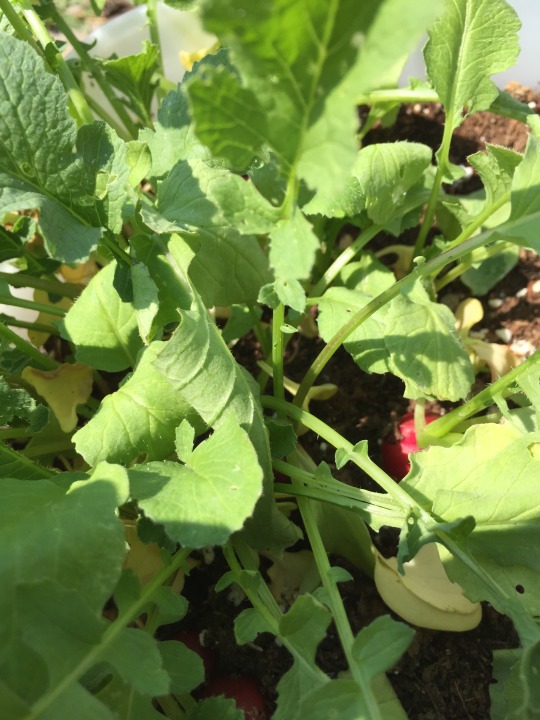
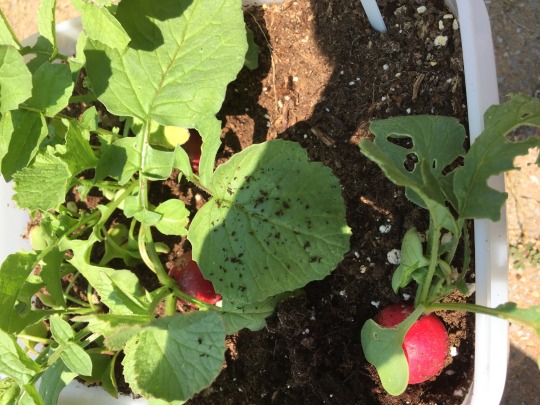
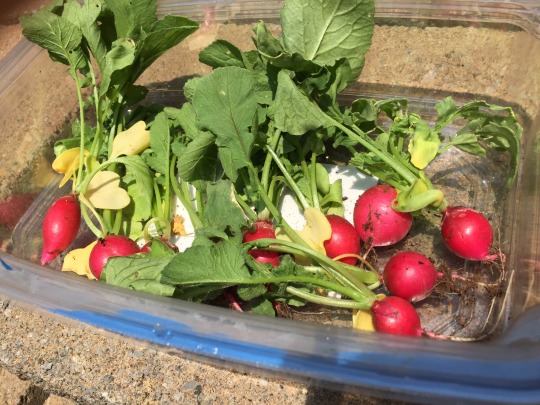
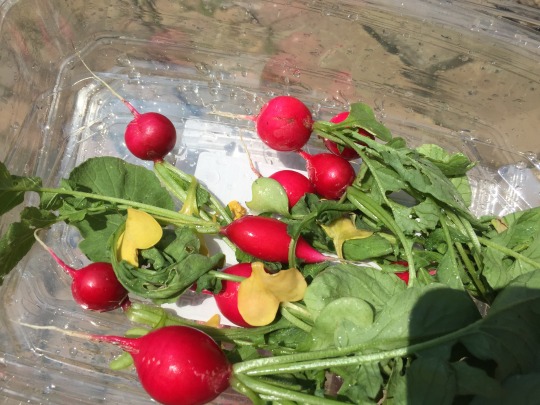
Who am I to turn down that higher eternal calling that descends upon the saintly ever so infrequently: throwing oneself wholeheartedly into a quickly fading food fad.
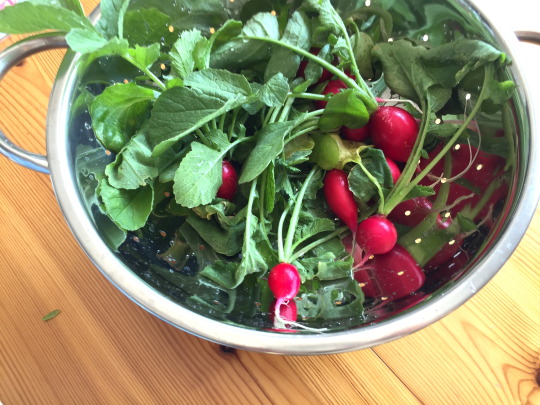
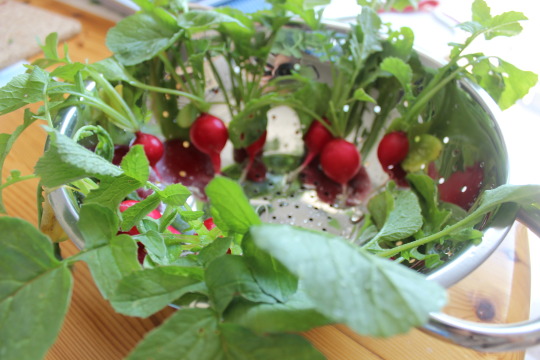
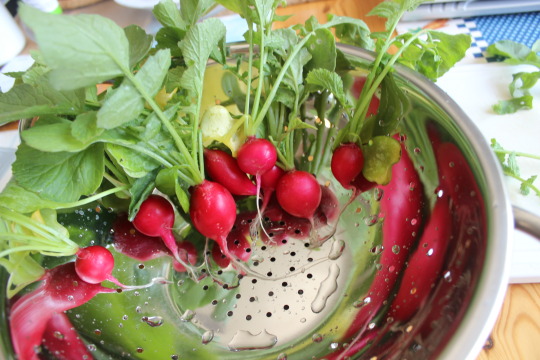
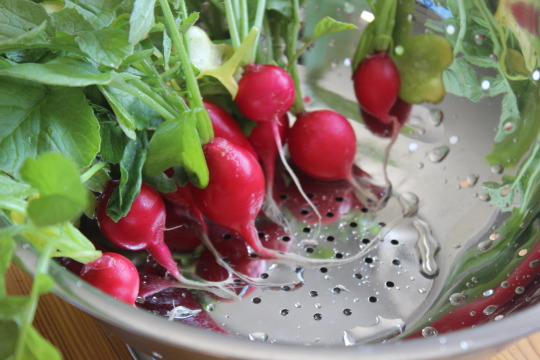

Admittedly I was somewhat crestfallen at the time when I discovered there were no avocados in the house, so I had to momentarily settle for hummus.


This was of course a temporary concession though, because I’m fairly certain hummus is only like second-order ‘millennial’. It’s not the key ‘millennial’ commodity behind the rising unaffordability of housing. I eventually did find the real deal to blow my carefully saved 20% down payment on.
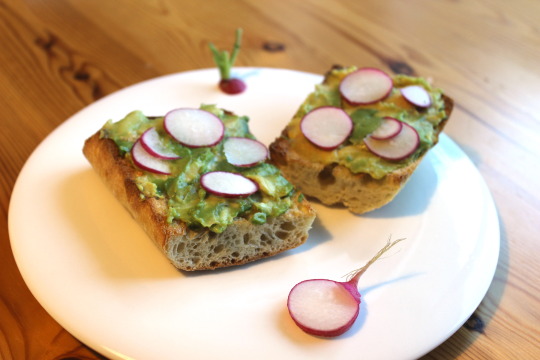
I was not aware radishes grew so quickly. The seed packaging mentions only 22 days, so the surprise made this epiphany all the more enjoyable. Less time to mess them up too. The rapid growth of the radish is in fact coded into its Latin nomenclature: Raphanus, which derives from the Greek ra (quickly) and phainomai (appear). Like magic. Or an Instagram shot.
I’ve heard radishes are most commonly used as a crisp garnish in salads, so I was certainly obliged to give that a try next. I gathered some baby kale and chard from the backyard, some cashews and pecans hanging about the house (as I learned from Robin Wall Kimmerer’s book “Braiding Sweetgrass”, the word pecan comes from ‘pigan’, meaning ‘nut’ in a variety of indigenous languages), mixed a vinaigrette, and came out with a fine tribute to my salad days of vegetable gardening — still green in judgement, cold in blood. But wow were those raw baby greens bitter.
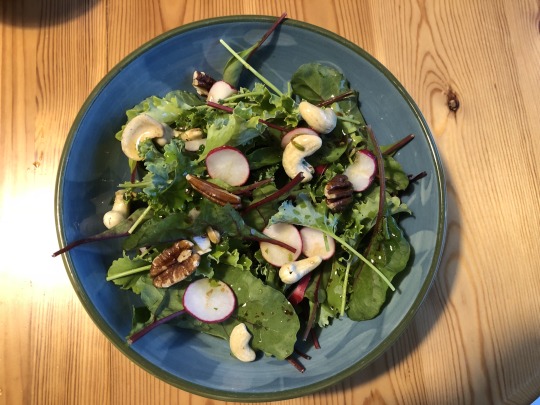
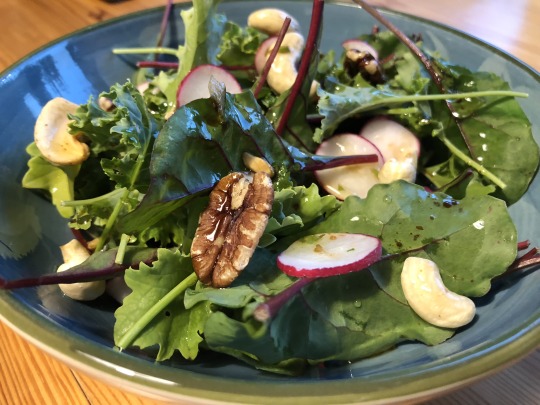
I toasted my next batch into kale and chard ‘chips’, an old pastime my mom and I enjoy doing together.
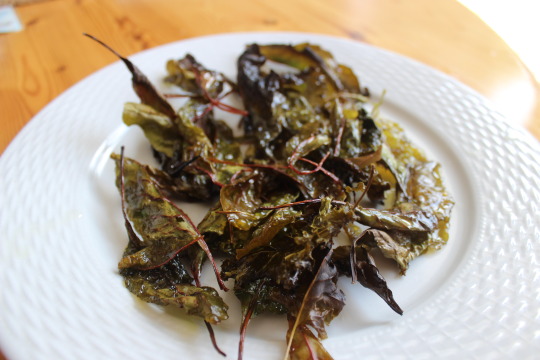
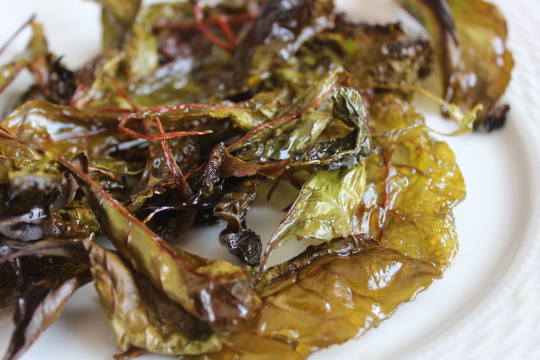
My happiest discovery however, was that the leafy greens of the radishes are entirely edible. I took a nibble on them and was ecstatically surprised! They have a peppery pinch to them, like arugula, and for good reason. They are mustard greens, and the whole plant contains glucosinolates present also in plants like mustard and wasabi (which is also known as ‘Japanese horseradish’; in fact what passes for ‘wasabi’ in most ‘Japanese’ restaurants is in fact ‘western horseradish’; whatever the case, both names make the connections to the radish more explicit). I suppose glucosinolates emerged as a form of plant defence against pests and microorganisms, as they can be used as a natural pesticide. Glucosinolates are also toxic to animals (including humans) at high levels, but healthy for us in smaller doses that you can find in for example… radishes. Harold McGee mentions them in his description of the cabbage family (yes radishes are in the cabbage clan):
“When the plant’s cells are damaged, the two stock-piles are mixed, and the enzymes start a chain of reactions that generates bitter, pungent, and strong-smelling compounds. The special cabbage-family system is effective enough to have inspired a notorious man-made version, the mustard gas of World War I. And the cabbage family turns out to have parts of the onion defensive system (p. 310) as well; these contribute some sulfur aromatics to the overall family flavor.
The stockpiled defensive precursors in the cabbage family are called glucosinolates. They differ from the onion precursors in containing not only sulfur, but also nitrogen, so they and their immediate flavor products, mainly the isothiocyanates, have distinctive qualities. Some of the flavor precursors and products are very bitter, and some have significant effects on our metabolism. Particular isothiocyanates interfere with the proper function of the thyroid gland and can cause it to enlarge if the diet is poor in iodine. But others help protect against the development of cancer by fine-tuning our system for disposing of foreign chemicals. This is the case for substances in broccoli and broccoli sprouts”
In this sense glucosinolates are not unlike caffeine, also produced by coffee trees as a defence mechanism, and highly toxic to humans at high concentrations. However, caffeine’s concentration is so low in coffee, it’s apparently very difficult to die of caffeine poisoning by drinking coffee alone (as I amusingly read in the book “Tree: A Life Story” by David Suzuki and Wayne Grady). In the case of most leafy greens, Michael Pollan hints at this sort of paradox in the Omnivore’s Dilemma when he discusses the mysterious nature of bitterness:
“Taste in humans gets complicated, but it starts with two powerful instinctual biases, one positive, the other negative. The first bias predisposes us toward sweetness, a taste that signals a particularly rich source of carbohydrate energy in nature. …A sweet tooth represents an excellent adaptation for an omnivore whose big brain demands a tremendous amount of glucose (the only type of energy the brain can use), or at least it once did, when sources of sugar were few and far between. (The adult human brain accounts for 2 percent of our body weight but consumes 18 percent of our energy, all of which must come from a carbohydrate…)
Our sense of taste's second big bias predisposes us against bitter flavors, which is how many of the defensive toxins produced by plants happen to taste… A bitter flavor on the tongue is a warning to exercise caution lest a poison pass what Brillat-Savarin called the sense of taste's "faithful sentries." Yet helpful as it is, our sense of taste is not a completely adequate guide to what we can and cannot eat. In the case of plants, for instance, it turns out that some of the bitterest ones contain valuable nutrients, even useful medicines… Once humans discovered the curative properties of salicylic acid in willows (the active ingredient in aspirin) and the relief from pain offered by the poppy's opiates, our instinctive aversion to these plants' bitterness gave way to an even more convincing cultural belief that the plants were worth ingesting even so��”
Pollan then goes onto explain how cooking was another way humans have dealt with bitterness, from Native Americans soaking, grinding, and roasting acorns to access protein, to my toasting young kale and chard from my backyard to make them more palatable.
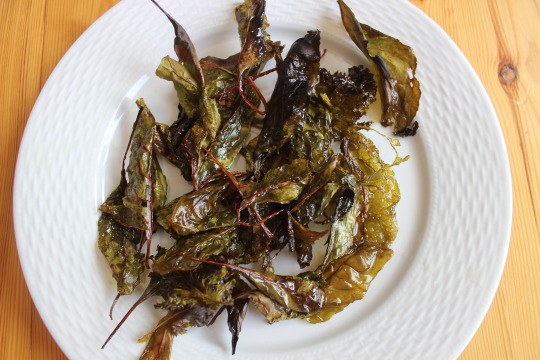
A very long tangent from radish leaves, but anyways, they’re edible and they’re good! I decided to put them in a pesto. I only used fresh lemon, olive oil, garlic, salt and pepper, and it turned out even better than I expected. Plus you can avoid those wildly high sodium levels a lot of store-bought pesto is garnering a reputation for.
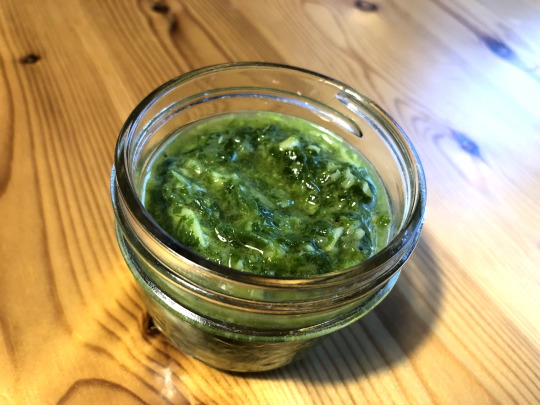
Now, I had to hunt down a good pasta shape. This BBC article recommended twists, but I wanted to confirm with something more authoritative. I consulted the pre-eminent Italian food historian Oretta Zanini De Vita’s “Sauces and Shapes” and she says the canonical shapes for pesto are ‘trenette’ or ‘trofie’, but ‘fusilli’ is also on the list of sanctioned shapes. I only had gemelli in my pantry, and to me it seems like a factory hybrid of trofie and fusilli, so gemelli it was. Gemelli is actually mentioned as a factory version of fusilli in De Vita’s ‘Encyclopedia of Pasta’, so I’m not way off base here.
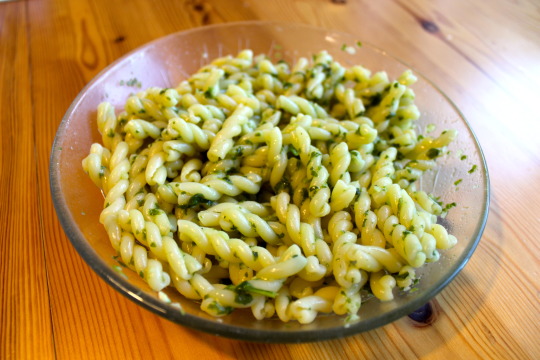
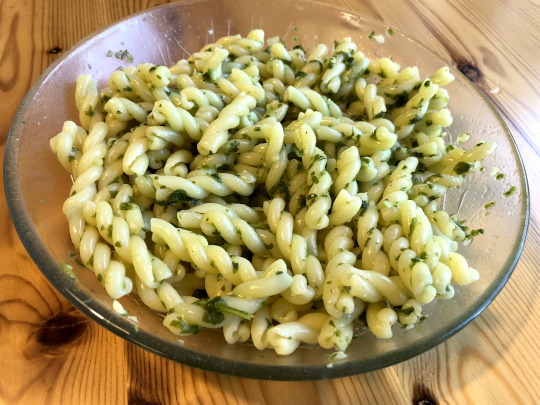
Now this all may come across as extremely bourgeois, but William Woys Weaver points out in “Heirloom Vegetable Gardening” that the great Greek physician Galen recorded radish leaves and stems as poor people’s food. It’s ‘bougie on a budget’ as my friend Andrew would say.
Gemelli is Italian for ‘gemini’ (which I am). The rumours are true. But I actually love the shape of gemelli because it’s like the helical shape of DNA, something I began encountering more and more as my curiosities regarding radishes and their origins became a fairly all-consuming research topic I couldn’t stop picking at, like an old stubborn scab.
Anarchist Biopolitics in Upland Southeast Asia
The story begins with the latest of my reading list obsessions. My reading interests move along in phases and Southeast Asia has been one of the more recent of these, especially as I prepared for my trip to Singapore (the G7 stronghold of the region).
Three pre-eminent Western scholars have come up in my readings of the region. The first is the anthropologist Clifford Geertz, who I first encountered through the work of postliberal and narrative theologians. He’s particularly known for his work on Java, including the religious traditions of that part of Indonesia. (As an aside: I also recently read an interesting critique of his work by Edward Said recently in “Covering Islam”.) The second scholar is Benedict Anderson, who’s most well known for his work “Imagined Communities” which I feel constituted a significant portion of Yuval Noah Harari’s thesis in “Sapiens” though was never directly mentioned or cited in Harari’s book. Anderson’s also a tremendously respected scholar among Indonesians themselves, and during his life, championed the work of literary figures like Pramoedya Ananta Toer. He’s probably one of the most important Southeast Asianists from ‘the West’ of the twentieth century, and is also well known in particular circles for his work re-named “Under Three Flags” which connected the resistance of Filipino anarchists and revolutionaries with wider anti-colonial resistance movements throughout the globe. I hope to read some of his work soon, and use it as a way into learning more about anti-colonial Filipino theology and folklore, especially regarding Jose Rizal and Isabelo de los Reyes. Finally the third scholar is James Scott, professor at Yale, who has interpreted Malaysian rural communities through the lens of anarchist resistance, and wrote an extremely important book in Southeast Asian studies called, “The Art of Not Being Governed: An Anarchist History of Upland Southeast Asia.”
I have been picking through some of these books lately, and was especially taken by James Scott’s ideas regarding how it would be a mistake to characterize the people living in remote hills of Southeast Asia as our ‘living ancestors’ or ‘primitive’ people who as Scott sarcastically put it, somehow failed to “[discover] wet-rice cultivation, Buddhism, and civilization.” Rather their ways of living are carefully chosen and deliberate practices that allow them to live as much as possible outside the orbit or influence of governing states. They live in remote areas and difficult terrain that is notoriously difficult to navigate. Their ‘illiteracy’ is in fact a very convenient way to avoid the concentrating of power in a clerical class as well as keeping raiders ignorant of where people live and where valuables are located, unlike societies that contain written records of such information. And one of the things I was most fascinated by was Scott’s idea that the cultivation of root vegetables is particularly suitable for those trying to evade coercive state power, as opposed to crops like grain or rice, which he argues are vital for state-making throughout most of history. Scott frames the dichotomy in this way:
“Virtually everywhere, wet rice, along with the other major grains, is the foundation of early state-making... From a tax collector’s perspective, grains have decisive advantages over, for example, root crops. Grain, after all, grows aboveground, and it typically and predictably all ripens at roughly the same time. The tax collector can survey the crop in the field as it ripens and can calculate in advance the probable yield. Most important of all, if the army and/or the tax collector arrive on the scene when the crop is ripe, they can confiscate as much of the crop as they wish. Grain, then, as compared with root crops, is both legible to the state and relatively appropriable.
...Slave-raiding expeditions, marauding armies, bandits, starving would-be pillagers of foodstuffs will, like states, find “state spaces” more lucrative for raiding than the slim pickings in sparse, mobile, root crop–growing societies with no permanent structure of authority. Such hill societies are, in this sense, not simply state repelling but appropriation resistant in general.”
This theme of avoiding state control by scattering into the hills actually shows up in 1 Kings 22. The prophet Micaiah is described by the King of Israel as another voice he and Jehoshaphat can seek council from, but at the same time the King of Israel admits to Jehosophat that “I hate him; for he doth not prophesy good concerning me, but evil.” When they do seek council, Micaiah sarcastically regurgitates what all the other prophets tell the kings: go into war, it’ll be an easy victory. But when the king presses him to tell the truth Micaiah says what the king was always most anxious about, the de-concentration of power:
“I saw all Israel scattered upon the hills, as sheep that have not a shepherd: and the Lord said, These have no master: let them return every man to his house in peace. And the king of Israel said unto Jehoshaphat, Did I not tell thee that he would prophesy no good concerning me, but evil?”
I found that eerily similar to James Scott’s descriptions of upland Southeast Asia, and geography really does have a way of fostering particular political relations. There’s a great essay by Stephen Jay Gould which describes an argument by Daniel Todes which seeks to explain why many intellectuals in the desolate landscapes of Russia (such as Kropotkin) emphasized ‘mutual aid’ over other scientists studying ecosystems in the tropics, who emphasized competition a lot more.
Anyways, back from this tangent, I was reading James Scott’s work on upland Southeast Asia around the time I began planting radishes. Not too long after I was reading the Wikipedia article for radishes and encountered an unreferenced claim that one of the primary locations scientists believe the radish originated from was Southeast Asia because that is where we find wild radishes growing today. I was immediately suspicious of this reasoning, but wondered if there was some truth to it. At the same time, I also read that the round, red radishes commonly found in Western countries today was the work of Dutch and Italian breeders of the 1500s/1600s. My fanciful mind wondered if there was a connection between Dutch colonialism of the Indonesian archipelago, and the radishes growing in my backyard? It was far-fetched, and I would soon find out — basically incorrect.
Firstly, radishes are not primarily the root vegetables Scott has in mind. For example, in “The Art of Not Being Governed” Scott writes:
“In general, roots and tubers such as yams, sweet potatoes, potatoes, and cassava/manioc/yucca are nearly appropriation-proof. After they ripen, they can be safely left in the ground for up to two years and dug up piecemeal as needed. There is thus no granary to plunder. If the army or the taxmen wants your potatoes, for example, they will have to dig them up one by one.”
While radishes are anarchist-inclined in the sense that they have to be dug up one by one when appropriated by the state, one cannot store radishes in the ground for such extended periods of time as tubers. That is why I assume Scott never explicitly mentions radishes in his book.
Secondly, radishes had been around in Europe for quite a long time, and thirdly, I have not been able to find a single credible source to support the Wikipedia article’s claim regarding the Southeast Asian origin of radishes. Yet, what I have discovered is that the precise origin of radishes and also radish domestication remains highly contested, and in fact a lot more complicated then I initially thought. And this obsession of mine regarding the ‘origin’ of the radish is reflective of a flawed way of posing such a question.
A Cosmogony of the Radish
Many of the papers I was reading seemed to think radishes originated either in the Mediterranean region or somewhere in Asia, sometimes sources preferring one region over the other. For example, this gardening guide by Cornell sets the radish’s origin in the Mediterranean.
On the other hand, the food historian and master gardener, William Woys Weaver, in his book “Heirloom Vegetable Gardening”, writes that:
“The oldest documentation of the radish takes us back to Asia in the form of literary references and archaeological remains in North China. From Asia the radish gradually moved westward, more or less following large human migrations. Ancient Greek travel writer Herodotus planted the long-held belief that the early Egyptians grew radishes, but Egyptologists have exploded this for several reasons. Herodotus could not read hieroglyphics, and if he could he would have been hard put to find one for the radish, or for radish used in the context of the inscription he claimed to have seen on a pyramid. The word for radish did not exist in Egyptian until the radish was introduced to Egypt by the Greeks. In all likelihood, the Greeks came in contact with the radish via India or with trade across the Black Sea. They were well acquainted with it long before the Egyptians and recognized many distinct varieties.”
I know Herodotus is notorious for getting things wrong, though I couldn’t find that much commentary on his mention of radishes while he visiting Egypt as an esteemed tourist, though I did find the classicist Barry Baldwin confirm that Herodotus
“is always ridiculed for credulity in the matter of the inscription on the Great Pyramids of Cheops, which purported to list the leeks, radishes, &c., provided for the workmen.”
Despite this, the mention of radishes used as payments in the construction of the Great Pyramids of Cheops (also known as the Great Pyramids of Giza) is still commonly mentioned in peer-reviewed papers on the radish, most often by genomic scientists rather than historians. One paper by Yamagishi and Terachi (2003) claims:
“As depicted on the walls of the pyramids built about 4000 years ago (Crisp 1995), cultivation of the radish (Raphanus sativus L.) has a long history.”
Yet despite this historical blunder, the insights of genomics have been particularly interesting regarding the radish’s origins. The same paper opens by saying:
“These results provide evidence that cultivated radishes have multiple origins from various wild plants of Raphanus.”
Closer to the end of the paper it states:
“It is thought that the wild plants with different mtDNA were grown simultaneously in various regions of the world. Some wild plants were selected by humans as a food crop depending on their needs. Possibly this effort was made independently at multiple times in different regions of the world, as this is reflected by the divergence of mtDNA in the cultivated species we have described here.”
Another paper (Kyoko Yamane et al. 2009) specifies a similar idea with some additional details:
“The MSN provides evidence for at least three independent domestication events, including black Spanish radish and two distinct groups of cpSSR haplotypes. One of these two haplotype groups is restricted geographically to Asia. This led Asian cultivated radish haplotypes to higher cpSSR diversity than Mediterranean cultivated radish or wild radish. These data are consistent with the diversity and distribution of agronomic traits in cultivated radish. At the same time, this implies that Asian cultivated radish is not originated from the diffused descendants of European cultivated radish, probably originated from a wild species that is distinct from the wild ancestor of European cultivated radish. Unfortunately we do not know the wild ancestor of Asian cultivated radish.”
In Theoretical and Applied Genetics, Kim et al. (2016) reiterate the idea that contemporary radishes we have today were from
“an ancient domesticated species native to both the Eastern Mediterranean and Eastern Asia (Becker 1962; George and Evans 1981; Kaneko and Matsuzawa 1993). Thus, the Middle East, Eastern Mediterranean, and Asian regions are considered possible centers of origin (Warwick 2011). Also, studies based on molecular markers have suggested that domestication of wild radish occurred independently in multiple regions (Yamagishi 2004; Yamagishi and Terachi 2003; Yamane et al. 2005, 2009).”
Finally, a website dedicated to radish genomics, hosted by Dr Zhangju Fei’s lab at Cornell, specifies the Mediterranean as the origin site for the genus Raphanus. Yet while the book chapter cited for this claim (by Yukio Kaneko et al. in the book “Genome Mapping and Molecular Breeding in Plants”) plainly says that the genus Raphanus originates between the Mediterranean and Black Sea, it also elaborates a bit on the complexities of how wild species fit into the picture:
“Tsunoda (1979, 1991) assumed that the wild species of radish belonged to only R. raphanistrum and had their origin in the coastal area from the Mediterranean to Black Sea. R. raphanistrum was distributed widely in Russia and the New World, but not in Japan, China or India (Warwick 1993; Hinata 1995). Recently, the genus Raphanus was classified into two species, R. sativus and R. raphanistrum, where the latter comprises other wild species as the subspecies R. raphanistrum (Hi- nata 1995).
The wild radish, the so-called Hama-daikon, R. sativus var. hortensis f. raphanistroides Makino (Kitamura 1958), or R. raphanistrum ssp. maritimus (Hinata 1995), was naturally grown on the sea coast in East Asia. Another wild radish called Nora-daikon or No-daikon was naturally grown at the inland areas far from the coast. These wild radishes were thought to originate from the escape from the cultivated radish (Furusato and Miyazawa 1958; Kitamura 1958; Aoba 1981, 1988) or the migration of a weedy one becoming contaminated with cereals such as wheat and oat. However, the former view is supported by many researchers.
Hama-daikon and Nora-daikon are regarded as the germplasm resources to investigate the origin of cultivated radish and to improve the radish crop. The molecular studies on the DNA and genomics, besides morphology, ecology and cytogenetics might provide valuable insight on origin, differentiation and domestication of radish.”
So, in other words, the origin of the radish is still not so firmly determined. It’s funny because there is something that inclines me to imagine the first radish suddenly popping out of the ground one day, millions of years ago, as if ‘on the third day’ God burped radishes into existence ex nihilo. Yet the latest genomics research suggests that there likely is no one single origin of the radish.
The various domesticated radishes we have today possibly came from weedy escapees of formerly domesticated radishes. What we have then is a species that has woven its way in and out of human cultivation. This is the sort of thing Deleuze and Guattari elaborated on in a “Thousand Plateaus”:
“What we must determine is not an origin but points of intervention or insertion in the framework of the reciprocal presupposition of the two forms.”
This eschewal of single origins that we find here in Deleuze and Guattari has proliferated in a lot of recent cosmological theories of the multiverse, which the Wesleyan professor Mary-Jane Rubenstein comments on so brilliantly throughout in her book “World Without End: The Many Lives of the Multiverse” tracing this cosmological tension all the way back to Ancient Greek debates, which occurred millennia ago.
Though the radish is a root, Deleuze and Guatarri famously put forward the image of the rhizome as an alternative metaphor to the predominant root metaphor. In contrast to their being a single origin or genesis in a linear chronology, the
“rhizome has no beginning or end; it is always in the middle, between things, interbeing, intermezzo.”
Of root imagery, Deleuze and Guattari say:
“The tree and root inspire a sad image of thought that is forever imitating the multiple on the basis of a centered or segmented higher unity... Arborescent systems are hierarchical systems with centers of signifiance and subjectification, central automata like organized memories. In the corresponding models, an element only receives information from a higher unit, and only receives a subjective affection along preestablished paths. This is evident in current problems in information science and computer science, which still cling to the oldest modes of thought in that they grant all power to a memory or central organ.”
Yet the complex and rich genomic history of the radish resembles the rhizomatic structure Deleuze and Guatarri allude to, and the radish taking form both as a large domesticated taproot and a weedy escapee — its history of meandering in and out of human cultivation is ultimately a history of weaving in and out of human control.
Exodus as Theme
While James Scott never mentions radishes in his anarchist history of upland Southeast Asia, these root vegetables share a lot in common with the people he is describing (escapees from the domination of centralized control):
“At a time when the state seems pervasive and inescapable, it is easy to forget that for much of history, living within or outside the state—or in an intermediate zone—was a choice, one that might be revised as the circumstances warranted. A wealthy and peaceful state center might attract a growing population that found its advantages rewarding. This, of course, is the standard civilizational narrative of rude barbarians mesmerized by the prosperity made possible by the king’s peace and justice—a narrative shared by most of the world’s salvational religions, not to mention Thomas Hobbes.
This narrative ignores two capital facts. First, as we have noted, it appears that much, if not most, of the population of the early states was unfree; they were subjects under duress. The second fact, most inconvenient for the standard narrative of civilization, is that it was very common for state subjects to run away. Living within the state meant, virtually by definition, taxes, conscription, corvée labor, and, for most, a condition of servitude; these conditions were at the core of the state’s strategic and military advantages. When these burdens became overwhelming, subjects moved with alacrity to the periphery or to another state.”
In another of his books, “Against the Grain”, Scott talks about the implications of the cultivated field and garden, where domesticated species for the most part develop a deep dependency on human control, not unlike people like myself who live within the control of nation-states today:
“The purpose of the cultivated field and of the garden is precisely to eliminate most of the variables that would compete against the cultigen. In this man-made and -defended environment—other flora, exterminated for a time by fire, flood, plough, and hoe, pulled out by their roots; birds, rodents, and browsers scared off or fenced out—we make a nearly ideal world in which our favorites, perhaps carefully watered and fertilized, will flourish. Steadily, by coddling, we create a fully domesticated plant. “Fully domesticated” means simply that it is, in effect, our creation; it can no longer thrive without our attentions. In evolutionary terms a fully domesticated plant has become a superspecialized floral “basket case,” and its future is entirely dependent on our own. If it ceases to please us, it will be banished and almost certainly will perish. Some domestic plants and animals (oats, bananas, daffodils, day lilies, dogs, and pigs) have, as we know, resisted full domestication and are capable, to varying degrees, of surviving and reproducing outside the domus.”
This excerpt carries an endnote that elaborates more on some of the species that have managed to escape human control rather successfully:
“the weedy escapees, rather like pigs, ...do manage to thrive outside the domus: oats, rye, vetch, false flax, carrot, radish, and sunflower.”
In this sense radishes are one of those anarchist inclined species that itself can make the exodus out of human control and make it on its own in the wild.
In other words to become a ‘weed’ a plant grows outside the domain of human sanction or control, and sometimes so successfully that, like humans, they become invasive species. So for example, the wild radish, is considered “Primary Noxious, Class 2 in the Canadian Weed Seeds Order, 2016 under the Seeds Act.” Wild radishes are only one among a number of weedy root vegetable escapees or ancestors including the wild parsnip and the wild carrot.
The wild carrot is also known as Queen Anne’s Lace, named - in part - after a queen from the land of Kierkegaard. It is so pervasive I stumble upon it almost every day around Mississauga and Toronto. There’s a house in my neighbourhood that infrequently has its lawn mowed and wild carrots have colonized the yard. I happen to think it’s quite pretty, though they can allegedly be fined by the municipality, which I think to be ridiculous. There are a number of wild carrots growing along the edge of a wood lot just across the street from where I live (literally a matter of steps from my front door).
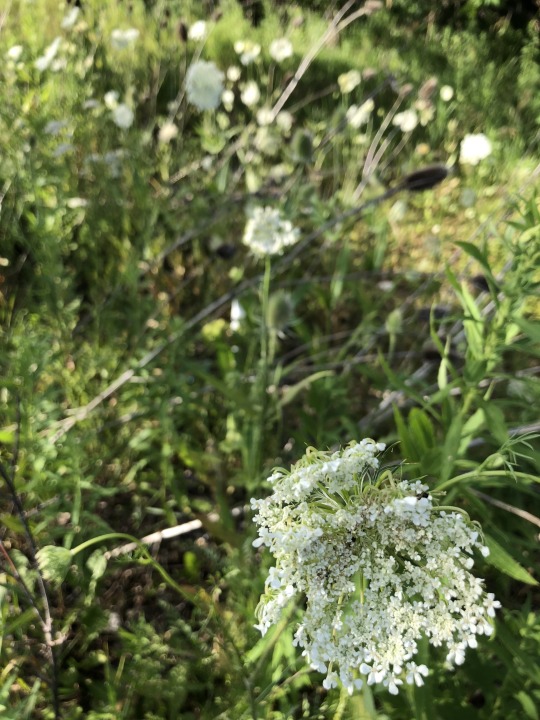
The wild carrot likely originated somewhere around Persia or present-day Afghanistan, and was originally domesticated for its leaves as a herb, like other members of its family including cilantro and dill (another plant from the Port Credit Seed Library that I’m growing; my little dill fellas did not do too badly this summer actually).
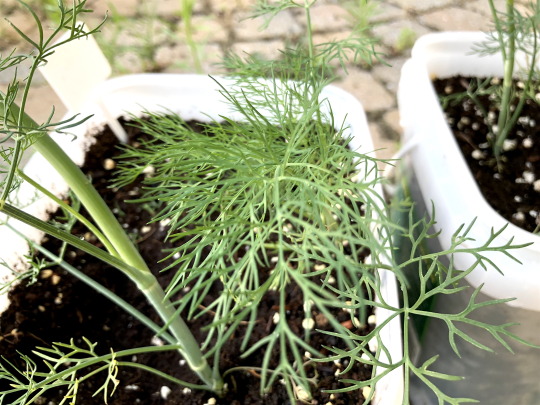
Dill is often called ‘dillweed’ because of its vivacious reproductive habits. Because I’m not the greatest at caring for plants you can see in the picture below the yellow flowers beginning to pop up, meaning it senses its eminent death and is working to go to seed before it dies.
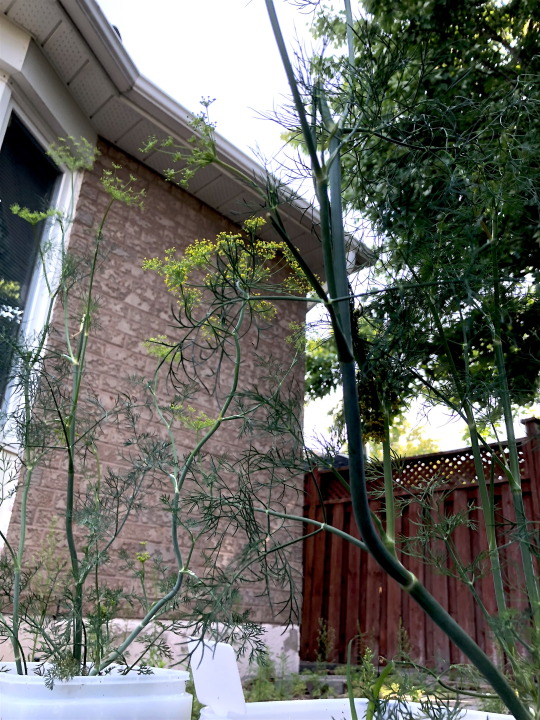
As a quick aside I’ve found that dill pairs beautifully with wildflower honey and olive oil spread about a slice of this lovely marble rye sourdough bread from St. John’s Bakery (which runs Catholic Worker inspired programs in Toronto).
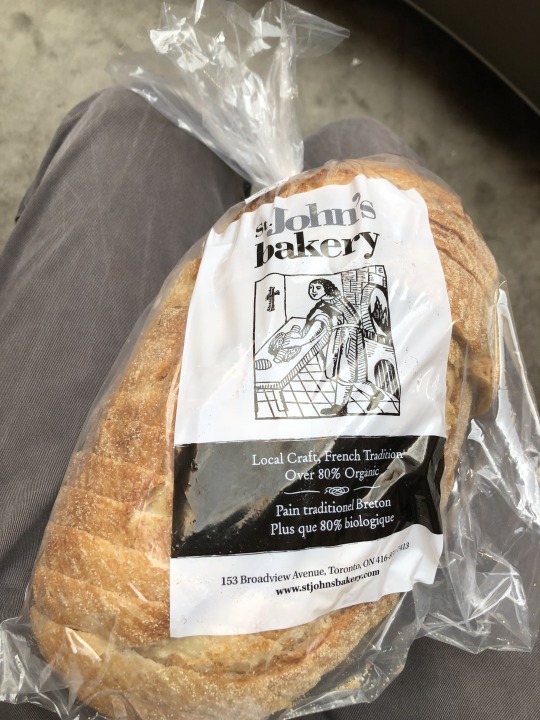
The bakery is operated by St. John the Compassionate Mission, who openly claim Dorothy Day as a significant influence in their mission statement. Dorothy Day, is also often claimed by anarchists like Colin Ward as one of their own. In my view, she has offered one of the most compelling interpretations of ‘render unto Caesar’s what is Caesar’s’ by saying:
“If we rendered unto God all the things that belong to God, there would be nothing left for Caesar.”
Anyways, I know someone once said we do not live by bread alone, but sometimes I think I really don’t need anything else. It’s quite good.


I enjoyed the honey dill pairing so much I even tried to marry it with some seltzer. The honey-dill soda was not quite as good as the bread, but still wasn’t bad at all. It gets better if the dill has some time to soak into the seltzer (overnight seems to yield better results).


Anyways, with respect to the wild carrot, agricultural preoccupation eventually narrowed to its often orange root, sometimes purple, sometimes yellow, sometimes something else. And so it is believed the carrot we have now was domesticated from wild carrots. Wild carrot is in fact edible, though its taproot is only edible when the plant is still young and yet to flower. The leaves as mentioned earlier can be used as an herb. The flower and seeds are apparently edible, although its seeds were documented by Hippocrates as a form of birth control, so that may be something to consider I suppose. In fact, the seeds of this plant are still used by women from Appalachia to India’s Rajasthan state as a herbal ‘morning-after’ concoction.
Wild carrot looks a lot like wild parsnip, which is noxious from the stem up and whose sap can cause burns when exposed to sunlight (although the wild parsnip’s root is still edible like the root of its domesticated cousin, the ‘normal’ parsnip).
There are other plants with umbels that resemble the wild carrot’s including giant hogweed (for which I commonly see signs in public parks warning of its ability to cause blindness), as well as water hemlock, which brought about the demise of Socrates.
What I find fascinating about plants like the wild carrot, wild parsnip, and wild radish (if they were in fact weedy escapees, which might be debatable, though they are certainly related) is that they have managed to sustain themselves outside of human control, even after they should have grown completely dependent on human cultivation. I think it is within the common fabric of human hubris to believe the world and nature depend on us to ‘sustain’ them. That ecosystems and all within them need us to have ‘dominion’ over them if they are to survive. One of my favourite poems is Mary Oliver’s “I Go Down To The Shore”:
“I go down to the shore in the morning and depending on the hour the waves are rolling in or moving out, and I say, oh, I am miserable, what shall— what should I do? And the sea says in its lovely voice: Excuse me, I have work to do.”
Every time I hear the Missinihe (Credit River) rushing a long at night, in the dark, enveloped in night, I think about Mary Oliver’s poem, and think how the river works its way, for kilometres and kilometres, out of sight, hidden in trees and night cover, with no help from us, it does its work. Every time I return to my plants the next day to water them, and they have enlarged, flowered, gone to seed, grown fruit, I find myself surprised. It feels like a true experience of ‘gift’ or ‘grace’, receiving something that I did nothing to earn. Something I did not work for, yet it simply presents itself, outside of my control or prodding. In fact the entire symphony of deciduous vegetation withers, dies, and comes alive every year, blooming into immense volumes of wildly varied plant forms. And ‘weedy’ escapees like wild radish or wild parsnip, these wild root vegetables are yet one more reminder of resilience, of gift, of grace outside our control.
The Communal Praxis of a Weedy Escapee
I look at all the sorts of hierarchies and systems of centralized control that I find myself within. As a Christian I might call them social systems of ‘idolatry’ for lack of a better term. They seem insurmountable, and not worth trying to resist, but I cannot escape the narrative of Exodus which compels from beyond for me to depart from such hierarchies. Often times it only remains a fantasy or a short-lived endeavour. I am too attached to the conveniences and comforts they provide. What sustains resistance in our exodus out of Pharaoh’s bondage?
James Scott understood upland Southeast Asia as a sort of refuge from state control, like the wilderness would be for the Israelites escaping Pharaoh in the Exodus narrative. In “The Art of Not Being Governed”, Scott writes:
“The main, long-run threat of the ungoverned periphery, however, was that it represented a constant temptation, a constant alternative to life within the state. Founders of a new state often seized arable land from its previous occupants, who might then either be incorporated or choose to move away. Those who fled became, one might say, the first refugees from state power, joining others outside the state’s reach. When and if the state’s reach expanded, still others faced the same dilemma.”
Scott draws a striking parallel between maroon communities and those ‘state refugees’ living in upland Southeast Asia:
“the study of maroon communities—of African slaves who had escaped and established communities outside the easy reach of slavers. These communities ranged in size from Palmares in Brazil, with perhaps twenty thousand inhabitants, and Dutch Guiana (Surinam), with that many or more, to smaller settlements of escapees throughout the Caribbean (Jamaica, Cuba, Mexico, Saint-Domingue), as well as in Florida and on the Virginia–North Carolina border in the Great Dismal Swamp. I shall elaborate a theory of “escape agriculture,” …We shall, in the context of describing upland peoples in Southeast Asia, encounter practices that bear a strong family resemblance to those of the maroons.
Runaway slaves clustered in precisely those out-of-the-way places where they could not easily be found: swamps, rough mountain country, deep forests, trackless wastes. They chose, when possible, defensible locations accessible by only a single pass or trail that could be blocked with thorns and traps and observed easily. Like bandits, they prepared escape routes in case they were found and their defenses failed. Shifting cultivation, supplemented by foraging, trade, and theft, was the commonest maroon practice. They preferred to plant root crops (for example, manioc/cassava, yams, and sweet potatoes), which were unobtrusive and could be left in the ground to be harvested at leisure. Depending on how secure the site was, they might plant more permanent crops, such as bananas, plantains, dry rice, maize, ground-nuts, squash, and vegetables, but such crops could more easily be seized or destroyed. Some of these communities were short-lived, others survived for generations… Occupying a distinctive agro-ecological zone with valued products, many maroon settlements were closely integrated into the larger economy by clandestine and open trade.”
There is a wonderful account of such a maroon community in Isabel Allende’s “Island Beneath the Sea” which is set in revolutionary Haiti. Scott observes deep similarities between this sort of maroon “escape agriculture” and the “shifting agriculture” (including swidden agriculture), a set of practices that helped sustain life outside of state space. The theologian, Walter Brueggemann, frames the Decalogue as a set of practices that some faith communities might draw on to sustain a life outside of coercive state power. In a recent sermon, he says:
“As you know, the Ten Commandments begin with the identification of the God who liberated Israel from Egypt: “I am the Lord your God who brought you out of the land of Egypt…” The word "Egypt" refers to Pharaoh, and Pharaoh is the abusive, brutalizing king of Egypt who practiced and exploited a concentration of power and wealth. You will notice that we do not know Pharaoh's name and that is because Pharaoh keeps turning up in our history time after time. So, Pharaoh is the right name for every brutalizing concentration of wealth and power that acts in violence against vulnerable people. The Exodus is the powerful acknowledgement of that brutalizing domain of human history from which we have been emancipated.
The covenant at Sinai is a warning that if you do not keep these commandments, you will be back in the grip of Pharaoh and his insatiable demands… Thus, the Ten Commandments are strategies for staying emancipated once you get away from Pharaoh. This new strategy, first of all, says you have to honor God - that's the first three commandments - to the exclusion of every idol, every "ism" such as racism, or sexism, or nationalism, or the worship of stuff that is rare or precious or attractive or beautiful or empowering. The new strategy means in the Ten Commandments to take the neighbor with utmost seriousness. So, the last five commandments are all about the neighbor and treating neighbors with legitimacy and dignity and viability and especially disadvantaged neighbors - not to violate the neighbor for the sake of greed. And between these two commandments of honoring God and taking the neighbor seriously, at the center of the Ten Commandments, is Sabbath day. Keep Sabbath: take a break from the rat-race of busyness and exhaustion and do not let Pharaoh define your life.”
Walter Brueggemann’s theological trajectory has always aligned itself with the prophetic tradition, which has pitted itself in critical resistance against the royal strain within the biblical canon (he has an ‘anarchist squint’ in the words of James Scott) which shares strong affinities with various Christian anarchist intellectuals like Paul Virilio, Ivan Illich, and Jacques Ellul (who has commonly highlighted the anti-monarchical sentiments of God in 1 Samuel).
There is a strange entangled history between anarchist ideology and Christian faith. Nietzsche, once pejoratively suggested anarchism to have essentially the same origin as Christianity, and I in many ways agree. Murray Bookchin agrees about modern anarchism’s origins, and even the European anarchist Kropotkin believed that European anarchist thought traced its way back to Anabaptist communities. Anabaptists have a reputation for a strong emphasis on praxis that allows them to function outside the coercive orbit of the state and corporate power. They live in a way that demonstrates the possibility of how ‘law’ (of God) can be something liberatory rather than oppressive. The narrative of the ‘law’ arriving after the Exodus, in the wilderness of Sinai of all places, fits neatly into James Scott’s characterization of upland ‘anarchist’ communities.
N.T. Wright, particularly in his book “Justification”, makes a case for why the common Protestant notion (by way of Luther) that the law is the standard by which Christians must perfectly live up to or else ‘perish’ (i.e. burn in hell) is a mistaken and inverted understanding of how the law fits into the biblical narrative. Wright astutely points out that the Ten Commandments were given to the Israelites after ‘salvation’ from Egypt. The law is not an impossibly cruel ladder we must fail to climb as humans before Jesus sweeps us up (that is, only if our theological convictions are sound). Rather, following redemption out of slavery - following the Exodus - the Ten Commandments are better thought of as practices which allow communities to sustain neighbourliness outside the destructive ways of idolatrous state power. Hauerwas said that:
“It is… never a question whether we will or will not develop habits and virtues, but what kind of habits and virtues we will develop.”
Hauerwas sees these habits as sustained by community that is intrinsically political. His ecclesiology perceives the
“church as a community capable of challenging the imperial pretensions of the modern state.”
If Christians are to find true allies in their endeavours to live faithfully, they should seek other communities who are sustaining practices (often odd practices from the perspective of Enlightenment modernity) in resistance to hegemonic state and corporate power (which as David Graeber argues, are part of the same structural complex, because as Colin Ward suggests “every state protects the privileges of the powerful.” Within a capitalist economy, state tax revenue relies on corporate profit, and therefore has an interest in keeping corporations happy.).
I think an exemplar of such a community are the indigenous ones described by scholars like Taiaiake Alfred and Glen Coulthard. Alfred advocates for a practical decolonization and believes that
“without the foundation provided by a connection to land-based cultural practices and the reestablishment of authentic indigenous community life, individualizing efforts actually work to compound the problems by promoting further alienation from proven sources of strength and healing on the individual level, and the social-cultural atomization of indigenous communities.”
Alfred and Coulthard draw on the work of Fanon to explain how colonization is also an ‘internal’, psychological issue. Alfred writes:
“In Fanon’s analysis, colonized people who mimic the ways of the colonizer – who assimilate to the mainstream – and suppress their natural selves on a conscious and unconscious level begin to suffer from various psychological disorders (Fanon, 1982). There is certainly no evidence that the issues around assimilation and psychopathology are any different for Indigenous people.”
The co-optation of local leaders by colonial powers is an old practice. One might conceive of the local clerical powers in the New Testament narrative involved in the detainment of Jesus as local leaders co-oped by Roman empire. As someone who has ancestral roots in Southeast Asia, I understand a lot of Lee Kuan Yew’s authoritarian and repressive policy as a continuation of British empire and its colonial rule. In Sartre’s preface to Fanon’s “Wretched of the Earth”, he writes:
“In the colonies... The European élite undertook to manufacture a native élite. They picked out promising adolescents; they branded them, as with a red-hot iron, with the principles of western culture, they stuffed their mouths full with high-sounding phrases, grand glutinous words that stuck to the teeth. After a short stay in the mother country they were sent home, whitewashed. These walking lies had nothing left to say to their brothers; they only echoed.”
This narrative of manufacturing an indigenous elite sounds a lot like the Babylonian captivity of young Israelites like Daniel and his friends Hananiah, Mishael, and Azariah who empire renamed: Belteshazzar, Shadrach, Meshach, and Abednego. One can see how empire tries to capture the very identity of their captives. They have captured them physically, but now they must capture them psychologically. Yet these boys resist the ways of empire. They do not accept their luxurious meat of empire, but sustain themselves on the wholesome vegetables of their own traditions. They do not bow down to empire, but have instilled a resistance within them. This is the great Jewish narrative which Christians have also sometimes recognized as important for sustaining true communities of resistance.
Ironically, there are these moments in history when the weedy escapee is woven back into the folds of power. The food czar Joseph in Egypt comes to mind when he helps create dynamics of debt then slavery for the sake of the Egyptian Pharaoh’s power. And here we have the Cherry Belle radish growing in my backyard.
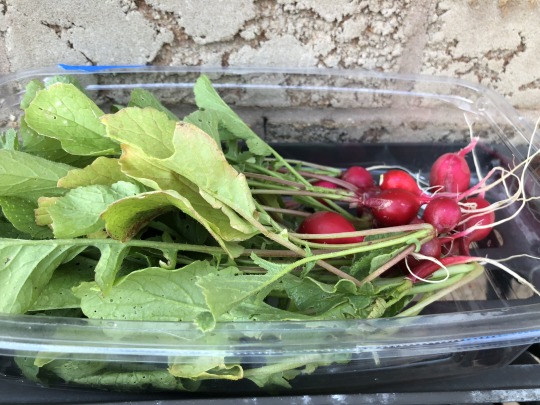
It was ‘introduced’ in 1948 by the vegetable breeders ZWAAN & Sons, and won its popularity after taking home the All America Selections prize. ZWAAN & Sons ‘gave us’ the pithy-resistant Cherry-Belle radish, which could be shipped long distances without becoming soft and spongey. Bred less for flavour than for how it fit into our highly globalized modernist mode of life. Like iceberg lettuce that could survive a trip soaked in ice, the Cherry-Belle radish could stay crispy longer. Perfect quality for marketing a commodity, rather than nurturing a species with its own agency and creativity.
Mutuality
There is a dominant myth around that renders the environment as something passive, almost inert, which must be shaped by human ingenuity. It perceives the world as a set of ‘laws’, straightforward cause and effect, which must be mastered to bring about the right ‘effect’. For whom? Well obviously ‘us humans’. This narrative imagines our species as ‘holding all things together for good’, as if it were our moral duty to bring about the full realization of ‘progress’ in this universe. To abandon our strange idea of ‘technological progress’ (whatever that means) would be a ‘waste’. Ecological needs other than human ones are merely distractions crafted by conspiring political powers to debilitate their opposition (i.e. global warming is a socialist hoax meant to injure the ‘growth’ of capitalist economies).
I would argue that currently the predominant idea of progress and good is deeply coloured by our making a virtue of being ‘in control’. For example, a homogenous field of grass is better than a diverse one of ‘weeds’. A garden full of wild flowering ‘weeds’ is abominable, flowers are only good when they can be neatly confined to their rightful place, and only exist when we tell them to and only when they’re the right kind that we want. The suburban and even urban yard is more a testament to human control and ingenuity than it is of any creative agency which another species might exhibit. Therefore, a garden full of ‘weeds’ is one not ‘taken care of’, i.e. under the auspices of human sanction.
I think in his book “The Singapore Grip”, F. G. Farrell made this insightful metaphor linking dandelions to the labour uprisings in Southeast Asia during early twentieth-century colonial rule:
“But the miners’ rash action (how naive they must have been to think that they would get away with it!) had been like a sudden gust of wind which fills the air with thistledown and strips the dandelion of its whiskers. In due course, given time for germination, strikes had begun to spring up all around. Next year it had been the turn of the pineapple factories. The year after that they had spread for the first time to the rubber estates. And what could the old man have done to prevent it? Not a thing.”
I thought it was so fascinating that Farrell so astutely linked plants growing outside of human sanction to the labour movements which grew outside colonial sanction. Plants that grow outside of human control (what we call ‘weeds’) are supposed to be inert objects without agency, shaped according to human will and intention. That is the same attitude the colonial administration saw the pool of cheap labour in Southeast Asia, which were treated merely as inputs for extractive capitalist machinery.
The Agency of Plants
This dehumanizing dynamic is an absence of what Martin Buber called an I-Thou relationship, the same notion Martin Luther King Jr. referenced in his “Letter from a Birmingham Jail” regarding the evils of segregation. I would argue that this is not dissimilar from the sort of thing the Anishinaabe botany professor Robin Wall Kimmerer talks about when she insists on referring to plants as persons with her students:
“I try to be mindful of my language, to be bilingual between the lexicon of science and the grammar of animacy. Although they still have to learn scientific roles and Latin names, I hope I am also teaching them to know the world as a neighborhood of nonhuman residents, to know that, as ecotheologian Thomas Berry has written, ‘we must say of the universe that it is a communion of subjects, not a collection of objects.’
One afternoon, I sat with my field ecology students by a wiikwegamaa and shared this idea of animate language. One young man, Andy, splashing his feet in the clear water, asked the big question. ‘Wait a second,’ he said as he wrapped his mind around this linguistic distinction, ‘doesn’t this mean that speaking English, thinking in English, somehow gives us permission to disrespect nature? By denying everyone else the right to be persons? Wouldn’t things be different if nothing was an it?’
Swept away with the idea, he said it felt like an awakening to him. More like a remembering, I think. The animacy of the world is something we already know, but the language of animacy teeters on extinction—not just for Native peoples, but for everyone. Our toddlers speak of plants and animals as if they were people, extending to them self and intention and compassion—until we teach them not to. We quickly retrain them and make them forget. When we tell them that the tree is not a who, but an it, we make that maple an object; we put a barrier between us, absolving ourselves of moral responsibility and opening the door to exploitation. Saying it makes a living land into ‘natural resources.’ If a maple is an it, we can take up the chain saw. If a maple is a her, we think twice.
Another student countered Andy’s argument. “But we can’t say he or she. That would be anthropomorphism.” They are well-schooled biologists who have been instructed, in no uncertain terms, never to ascribe human characteristics to a study object, to another species. It’s a cardinal sin that leads to a loss of objectivity. Carla pointed out that ‘it’s also disrespectful to the animals. We shouldn’t project our perceptions onto them. They have their own ways—they’re not just people in furry costumes.’ Andy countered, ‘But just because we don’t think of them as humans doesn’t mean they aren’t beings. Isn’t it even more disrespectful to assume that we’re the only species that counts as ‘persons’?’ The arrogance of English is that the only way to be animate, to be worthy of respect and moral concern, is to be a human.
A language teacher I know explained that grammar is just the way we chart relationships in language. Maybe it also reflects our relationships with each other. Maybe a grammar of animacy could lead us to whole new ways of living in the world, other species a sovereign people, a world with a democracy of species, not a tyranny of one—with moral responsibility to water and wolves, and with a legal system that recognizes the standing of other species. It’s all in the pronouns.” (Braiding Sweetgrass)
This orientation that Kimmerer exemplifies in her work shows up throughout all of Leanne Simpson’s retold Anishinaabeg stories in “The Gift is in the Making”. The animals and plants each belong to their own nations and have so many things to teach humans. For example, the radish and wild carrot can teach us ways of navigating in and out of the orbit of concentrated power and wealth.
When we deny agency and even personhood to other species, it implies a uni-directional relationship where only we shape the ‘inert’ and ‘inanimate’ world around us. There is no space for mutual transformation. Being the narcissistic species that we are, we often fail to recognize the immense ways the things in our environment shape us, both the plants and animals we ‘domesticate’ and even the machines we create out of the materials around us.
James Scott, in analyzing our institutional machinery in his book “Two Cheers for Anarchism” proposes:
“What if we were to ask a different question of institutions and activities than the narrow neoclassical question of how efficient they are in terms of costs (e.g., resources, labor, capital) per unit of a given, specified product? What if we were to ask what kind of people a given activity or institution fostered? Any activity we can imagine, any institution, no matter what its manifest purpose, is also, willy-nilly, transforming people. What if we were to bracket the manifest purpose of an institution and the efficiency with which it is achieved and ask what the human product was?”
Scott suggests that we often emphasize an ROI-inflected efficiency towards some unquestioned and measurable objective at the expense of understanding how particular institutions transform us and gradually and subtly change how we think and act in the world. This I believe is applicable to all things in our surroundings whether they be machines, advertisements, food, or plants.
Which would we rather be shaped by is, I suppose, a question we may ask, if the shaping and influence is inevitable. If I really do get to writing about the old milling town of Meadowvale Village post next time I hope to explore that question. As Marshall McLuhan says in “Understanding Media: Extensions of Man”: “we become what we behold... we shape our tools and afterwards our tools shape us.” So I wonder, at what point do we become the “tools of our tools”, as Thoreau once put it.
0 notes
Text
This Nationwide Program Is Teaching Millions of Students to Become Leftist Snowflakes
Photo Credit: Pixabay, PublicDomainPictures, CC0 Public Domain, https://pixabay.com/en/anger-angry-bad-burn-dangerous-18658/
Parents beware: A program called Challenge Day that applauds a culture of victimhood is planting the leftist agenda into young minds under the guise of anti-bullying education.
The program uses the power of peer pressure and groupthink to impress upon high school students the idea that everyone is a victim.
Challenge Day is no small initiative. According to the program’s website, it has been held at more than 2,200 high schools nationwide and reached millions of students.
Challenge Day purports to teach tolerance and acceptance, yet nearly every member of its board of directors and Global Leadership Council is politically left of center.
Of the 17 members of Challenge Day’s board of directors, 15 openly support leftist leaders and causes, and two have an unknown affiliation, according to Federal Election Commission records and personal social media accounts. Of their 22-person Global Leadership Council, 17 of the members support leftist leaders and causes.
This is an organization that preaches diversity but is not politically diverse itself.
The most concerning member of Challenge Day’s global governing board? The former “green-jobs czar” under President Barack Obama, Van Jones.
While Jones was in jail after a mass arrest, according to the East Bay Express, he said, “I met all these young radical people of color—I mean really radical, communists and anarchists. And it was, like, ‘This is what I need to be a part of.’”
When in high school, I myself participated in Challenge Day. At 16 years old, I was a junior at Grosse Pointe North High School, a public school outside Detroit.
I was asked to step forward if I were ever called a bad kid, tried to run away, isolated myself, was made fun of by someone I trusted, or felt as if I were treated differently because of my skin color.
Approximately 100 of my peers joined me in this exercise. During this session, I felt pressured to cry, and if I didn’t cry I was made to feel heartless. Whenever someone burst out in tears, we were asked to raise our hands in unity with our hands in a “love gesture.”
In truth, it felt like an initiation ceremony for a cult.
Everyone was asked to confess their challenges. At that age, I learned to move on from my struggles and show strength when faced with adversity. Yet, I felt compelled to come up with something to say with a tear in my eye.
It felt “cool” to be a victim and to cry during public “apologies.”
During the exercise, I finally came up with an experience that fit the program’s conception of victimhood. On Election Day in 2012, I wore a “Mitt Romney for President” T-shirt to school.
In a discussion about the election, one of the students sitting next to me in class opined that those who refused to support Obama were racist.
So, at Challenge Day when asked to step forward if I had been treated differently because of my skin color, I did. Yet, students did not display the “love gesture.” Instead, I was met with blank stares.
Perhaps I would have been better off apologizing for my sex or my skin color.
Although schools often ask for the permission of parents before students participate, the program largely leaves parents out of the equation and often unaware of the curriculum of the program, or what their children say that day.
Organizers do not apprise parents of any identified problems and, as a result, parents may not know if their children need actual professional help.
Recently, Challenge Day’s leftist indoctrination became even more apparent.
After the election of President Donald Trump, the organization released a statement on its website implying that Trump is a bully, noting, “Since the election, reports have arisen of young people on campuses all over the United States who do not feel safe on campus due to acts of violence, bullying, racism and intimidation.”
Challenge Day conveniently left out the fact that the president has encouraged no such behavior and that many of these reports have been proven false.
Furthermore, the organization forgets the countless reports of violence against conservative students, including the violent riots at the University of California, Berkeley when conservatives attempted to speak there, the left-driven riots and arson during Trump’s inauguration, and the anti-Trump May Day demonstrations in Portland, Oregon.
In the same statement, Challenge Day’s endorsement of the politics of privilege becomes more apparent. It said: “We stand in solidarity with all of our communities; from the marginalized to those who have privilege and are committed as allies.”
Challenge Day even released a “Post-Election Kindness Grant.” The grant goes to schools that “have experienced post-election bullying” and want to participate in Challenge Day programs.
It must think the general public is naïve when it says that the grant is not driven by a leftist agenda. From my research, Challenge Day’s “post-election” statement and grant were not issued after previous elections.
If a school doesn’t receive a “Post-Election Kindness Grant,” it can always rely on the taxpayer. According to Challenge Day’s website, schools “have used a variety of federal, state, and foundation grants to pay for Challenge Day programs.”
According to its website, “Common grants include School Climate Transformation Grants, GEAR UP, TRIO programs including Upward Bound, i3 Grants, School Improvement Grants, and Title 1 funding, among others.”
Yes, the taxpayer is footing the bill for additional leftist indoctrination programs in high schools.
No longer are young people taught to find the good in people and society, to be optimistic, to be self-reliant, to be hopeful, and to have good relationships with their families.
Programs like Challenge Day teach students to find divisions constantly: Everyone and everything is racist, poses a direct threat to their safety, or is the product of some form of social privilege.
Instead of teaching resilience, respect, and independence, students are taught to break down and cry, discuss their feelings, and check their social “privilege.”
Want to end bullying? Teach the golden rule: “Do unto others as you would have them do unto you.” Or, teach the great commandment: “Love thy neighbor as thyself.” That’s all you need.
The kind of victimhood culture that Challenge Day promotes has devastating consequences for our society. This is particularly the case when students become adults who are unable to recognize the importance of free speech and individual responsibility.
If Challenge Day is coming to your child’s school, hold the school’s leadership accountable. Ask how the program is funded or if a comparable program promoting individual responsibility and traditional values is offered.
Also, the Department of Education should ensure that federal funds no longer finance programs with such fractious ideological agendas.
Until students, parents, educators, and public policy leaders take action against snowflake-producing programs such as Challenge Day, our society will continue down this perilous path of political correctness and national division.
Commentary by Grant Strobl. Originally published at The Daily Signal.
0 notes
Text
27th February >> Fr. Martin’s Reflection on Today’s Gospel Reading (Mark 10:17-27) for Monday, Eighth Week in Ordinary Time: ‘Everything is possible for God’.
Monday, Eighth Week in Ordinary Time Gospel (Europe, New Zealand, Australia, Canada & South Africa) Mark 10:17-27 Jesus was setting out on a journey when a man ran up, knelt before him and put this question to him, ‘Good master, what must I do to inherit eternal life?’ Jesus said to him, ‘Why do you call me good? No one is good but God alone. You know the commandments: You must not kill; You must not commit adultery; You must not steal; You must not bring false witness; You must not defraud; Honour your father and mother.’ And he said to him, ‘Master, I have kept all these from my earliest days.’ Jesus looked steadily at him and loved him, and he said, ‘There is one thing you lack. Go and sell everything you own and give the money to the poor, and you will have treasure in heaven; then come, follow me.’ But his face fell at these words and he went away sad, for he was a man of great wealth. Jesus looked round and said to his disciples, ‘How hard it is for those who have riches to enter the kingdom of God!’ The disciples were astounded by these words, but Jesus insisted, ‘My children,’ he said to them ‘how hard it is to enter the kingdom of God! It is easier for a camel to pass through the eye of a needle than for a rich man to enter the kingdom of God.’ They were more astonished than ever. ‘In that case’ they said to one another ‘who can be saved?’ Jesus gazed at them. ‘For men’ he said ‘it is impossible, but not for God: because everything is possible for God.’ Gospel (USA) Mark 10:17-27 Go, sell what you have, and give to the poor. As Jesus was setting out on a journey, a man ran up, knelt down before him, and asked him, “Good teacher, what must I do to inherit eternal life?” Jesus answered him, “Why do you call me good? No one is good but God alone. You know the commandments: You shall not kill; you shall not commit adultery; you shall not steal; you shall not bear false witness; you shall not defraud; honor your father and your mother.” He replied and said to him, “Teacher, all of these I have observed from my youth.” Jesus, looking at him, loved him and said to him, “You are lacking in one thing. Go, sell what you have, and give to the poor and you will have treasure in heaven; then come, follow me.” At that statement, his face fell, and he went away sad, for he had many possessions. Jesus looked around and said to his disciples, “How hard it is for those who have wealth to enter the Kingdom of God!” The disciples were amazed at his words. So Jesus again said to them in reply, “Children, how hard it is to enter the Kingdom of God! It is easier for a camel to pass through the eye of a needle than for one who is rich to enter the Kingdom of God.” They were exceedingly astonished and said among themselves, “Then who can be saved?” Jesus looked at them and said, “For men it is impossible, but not for God. All things are possible for God.” Reflections (6) (i) Monday, Eighth Week in Ordinary Time In the gospel reading a man of great wealth runs up to Jesus with a burning question, ‘What must I do to inherit eternal life?’ Here was someone who clearly wanted to take the path of life, God’s path that leads to eternal life. He subsequently declares to Jesus that he has kept God’s commandments since his earliest days. He has been serious about his faith life, since his early youth. He was a good man who wanted to be better. He seems to have made an impact on Jesus. The gospel reading declares that ‘Jesus looked steadily at him and loved him’. Jesus looks steadily at all of us and loves us as we struggle to take the path of life that God is calling us to take. It was out of his love for this man that Jesus now invites him to take another step on his faith journey, a more generous and demanding step. Jesus calls him to walk away from his great wealth and to follow him as a disciple on the road to Jerusalem. Jesus knew that this was the path that would be truly life giving for this man. Yet, it proved a step too far for him. In response to Jesus’ call, we are told that ‘he went away sad’. It is one of the saddest verses in the gospels. It is because the Lord loves us that he is always calling us to take that extra step in our relationship with him, in our following of him. Like the man in the gospel, we too can hesitate to take that extra, more generous, more demanding, step on our journey of faith. We may feel it is more than we are able for. Yet, if we take the step the Lord is calling us to take, God will be our help and our strength. In the power of God’s help and strength we will be able to do what we cannot do on our own. As Jesus declares at the end of the gospel reading, ‘Everything is possible for God’. And/Or (ii) Monday, Eighth Week in Ordinary Time Sometimes when we ask a question, we can find the answer to our question difficult to come to terms with. That is the case with the rich man who ran up to Jesus in this morning’s gospel with the question, ‘What must I do to inherit eternal life?’ When Jesus asked him to go beyond the Ten Commandments he had been keeping and to sell all he owned and follow Jesus along the way, he couldn’t live with that answer. We are told that he walked away sad. Jesus did not ask everybody he met to sell everything and to journey with him, but he did ask this man. This was this man’s particular calling. Like this man, we can often find ourselves faced with a call to do something which seems beyond us. The temptation can be to walk away from the call, even though to say ‘yes’ to the call would be the path to life for us. The Lord can call any one of us beyond where we are; he can call on us to grow in our relationship with him, to be more generous in our response to his presence. We may not be able to answer that call in our own strength, but we will be able to answer it with the Lord’s strength. In the gospel reading, Jesus declares that ‘everything is possible for God’. When Mary was called to become the mother of Jesus and she hesitated, that was the message she heard. The angel declared to her ‘Nothing will be impossible with God’. It is the message we too will hear whenever we seek to answer the Lord’s very particular call to each of us. And/Or (iii) Monday, Eighth Week in Ordinary Time There is a contrast in the gospel reading between the excited running of the man to Jesus and the sad walk of that same man away from Jesus. His excited running was motivated by the burning question that he wanted to ask Jesus, ‘What must I do to inherit eternal life?’ His sad walk away from Jesus resulted from his inability to live with the answer that Jesus gave to his question, ‘Go and sell everything you own and give the money to the poor… then come, follow me’. Not everyone whom Jesus encountered was called in this particular way. Some of those whom Jesus healed, for example, were told to return to their village and their home. However, the call to sell everything and follow Jesus in a very radical way was this particular man’s call and he was unable to answer it, because he was not free in himself. He was tied to his wealth; his possessions possessed him. We all have our own particular call from the Lord, although it will most likely take a different form to this man’s call. That call from the Lord which is unique to each of us is not just a once off call but a daily call. This morning’s gospel reminds us of the need to keep growing in the freedom to answer the Lord’s call, so that we are not held back from responding to it by our excessive attachments, whatever form they may take. And/Or (iv) Monday, Eighth Week in Ordinary Time The story of the rich man and Jesus is full of emotion. We are told that the man ran up to Jesus to ask his burning question, ‘What must I do to inherit eternal life?’ It is said of Jesus that he looked steadily at him and loved him. When the man could not respond to the call of Jesus he went away sad. In the space of a short exchange the man’s lively enthusiasm gave way to great sadness. Jesus’ love for this man could not win his heart. The man’s heart was wrapped up in his possessions and Jesus was helpless to do anything about it at the time. It is a reminder to us that Jesus needs our co-operation if his purpose for our lives is to come to pass. He calls but he cannot force a response, anymore than he could force the response of the idealistic man who had run up to him with such energy. The story reminds us that following Jesus will often mean letting go of something that we are holding onto for dear life. We may struggle to let go of what we need to let go of; it may seem impossible to do so at times, but we have the reassuring words of Jesus to the disciples after the rich man had left, ‘everything is possible for God’. With God’s grace we can do the seemingly impossible. And/Or (v) Monday, Eighth Week in Ordinary Time We all ask questions in the course of a week, even a day. Most of these questions get answered and we move on from them. However, there are other bigger questions in life that remain with us all our lives. We never get a full answer to them. These are questions that keep us seeking and asking. We find one of these big questions on the lips of the man who approached Jesus in today’s gospel reading, ‘What must I do to inherit eternal life?’ He was asking, ‘What is the path of life that I need to take?’ It is a question we can all identify with, because it remains our question. It is a fundamental human question. In response to his question, Jesus directs him to the core teaching of his own Jewish religious tradition, in particular, to the ten commandments, quoting six of those commandments. Our own religious tradition is the first place we often turn to in trying to answer the big questions of life. It is the search for the answer to the big questions of life that has given rise to the various religious traditions in the world. Our own religious tradition has the capacity to speak to each one of us in a very personal way. After quoting the tradition, Jesus then spoke to this man in a very personal way; he gave him a very personal calling on the basis of that tradition, ‘Sell everything you own… then, come, follow me’. Jesus did not insist that everyone who followed him should sell everything they owned. Mary and Martha who provided hospitality for Jesus were certainly among his followers but it seems they were not asked to sell their home. The Lord’s general call to us from our religious tradition takes on a very personal form for each one of us. Within the broad path we are all called to take, the Lord has a very particular path for each of us. In so far as we try to listen for that very personal call and try to respond to it we will find that path of life which the man in the gospel was looking for and we are all seeking. And/Or (vi) Monday, Eighth Week in Ordinary Time Several people ask questions of Jesus in the course of the gospels, many of which are very significant. One of the most important questions asked of Jesus is to be found on the lips of the rich man in today’s gospel reading, ‘What must I do to inherit eternal life?’ Here was a man whose perspective was not confined to this life only. He understood well that this earthly life was not the whole of reality. In response to his question, Jesus quoted the Ten Commandments. Jesus was saying to him that these Ten Commandments are the path to eternal life. That answer of Jesus remains valid for us today. However, we look to the life of Jesus to show us what it means to live the Ten Commandments to the full. The rich man wasn’t satisfied with Jesus’ answer; he felt called to something more. However, when Jesus put the more before him, he backed away from it. Like the rich man we too can experience within ourselves a desire to go beyond what is strictly necessary and required. As we struggle at time to give expression to that desire we draw strength from the final words of Jesus in today’s gospel reading, ‘for God all thinks are possible’. Fr Martin Hogan, Saint John the Baptist Parish, Clontarf, Dublin, Ireland. Parish Website: www.stjohnsclontarf.ieJoin us via our webcam. Twitter: @SJtBClontarfRC. Facebook: St John the Baptist RC Parish, Clontarf. Tumblr: Saint John the Baptist Parish, Clontarf, Dublin.
1 note
·
View note
Photo

28th May >> Fr. Martin’s Gospel Reflections / Homilies on Mark 10:17-27 for Monday, Eighth Week in Ordinary Time: ‘He went away sad’. Monday, Eighth Week in Ordinary Time Gospel (Europe, Africa, New Zealand, Australia & Canada) Mark 10:17-27 Give everything you own to the poor, and follow me Jesus was setting out on a journey when a man ran up, knelt before him and put this question to him, ‘Good master, what must I do to inherit eternal life?’ Jesus said to him, ‘Why do you call me good? No one is good but God alone. You know the commandments: You must not kill; You must not commit adultery; You must not steal; You must not bring false witness; You must not defraud; Honour your father and mother.’ And he said to him, ‘Master, I have kept all these from my earliest days.’ Jesus looked steadily at him and loved him, and he said, ‘There is one thing you lack. Go and sell everything you own and give the money to the poor, and you will have treasure in heaven; then come, follow me.’ But his face fell at these words and he went away sad, for he was a man of great wealth. Jesus looked round and said to his disciples, ‘How hard it is for those who have riches to enter the kingdom of God!’ The disciples were astounded by these words, but Jesus insisted, ‘My children,’ he said to them ‘how hard it is to enter the kingdom of God! It is easier for a camel to pass through the eye of a needle than for a rich man to enter the kingdom of God.’ They were more astonished than ever. ‘In that case’ they said to one another ‘who can be saved?’ Jesus gazed at them. ‘For men’ he said ‘it is impossible, but not for God: because everything is possible for God.’ Gospel (USA) Mark 10:17-27 Go, sell what you have, and give to the poor. As Jesus was setting out on a journey, a man ran up, knelt down before him, and asked him, “Good teacher, what must I do to inherit eternal life?” Jesus answered him, “Why do you call me good? No one is good but God alone. You know the commandments: You shall not kill; you shall not commit adultery; you shall not steal; you shall not bear false witness; you shall not defraud; honor your father and your mother.” He replied and said to him, “Teacher, all of these I have observed from my youth.” Jesus, looking at him, loved him and said to him, “You are lacking in one thing. Go, sell what you have, and give to the poor and you will have treasure in heaven; then come, follow me.” At that statement, his face fell, and he went away sad, for he had many possessions. Jesus looked around and said to his disciples, “How hard it is for those who have wealth to enter the Kingdom of God!” The disciples were amazed at his words. So Jesus again said to them in reply, “Children, how hard it is to enter the Kingdom of God! It is easier for a camel to pass through the eye of a needle than for one who is rich to enter the Kingdom of God.” They were exceedingly astonished and said among themselves, “Then who can be saved?” Jesus looked at them and said, “For men it is impossible, but not for God. All things are possible for God.” Reflections (7) (i) Monday, Eighth Week in Ordinary Time The opening words of Jesus’ reply to the rich man in today’s gospel reading has always intrigued me. The man addressed Jesus as ‘Good master’, and in reply Jesus says to him, ‘Why do you call me good? No one is good but God alone’. Jesus seems to be saying that not even he can fully express the goodness that is God. Yet, we believe that Jesus is the fullest revelation of God’s goodness possible in a human life. On the basis of what Jesus says, we would have to hold that there is even more to God’s goodness than Jesus has revealed. If Jesus is the fullest revelation of God’s goodness in a human life, we are all called to reveal something of God’s goodness in our own lives. The man who ran up to Jesus with his burning question was clearly a good man. He declared to Jesus that he had kept all of God’s commandments that Jesus quoted from his earliest days. The commandments Jesus quoted concern how we relate to others; they are the second section of the ten commandments. The first section of the ten commandments concern how we relate to God, the very first being that we should have no other god than the Lord God. This is where the man left something to be desired. He was very attached to his wealth; he served his wealth; it had become something of a god for him; he couldn’t leave it when Jesus asked him to. Jesus say his predicament as one we are all prone to. That is why Jesus turned to his disciples after the man left to warn them of the powerful attraction of possessions, of wealth. The first commandment is perhaps the hardest of all to live by. We are all prone to allowing something less than the one, true God to become god in our lives. And/Or (ii) Monday, Eighth Week in Ordinary Time Sometimes when we ask a question, we can find the answer to our question difficult to come to terms with. That is the case with the rich man who ran up to Jesus in this morning’s gospel with the question, ‘What must I do to inherit eternal life?’ When Jesus asked him to go beyond the Ten Commandments he had been keeping and to sell all he owned and follow Jesus along the way, he couldn’t live with that answer. We are told that he walked away sad. Jesus did not ask everybody he met to sell everything and to journey with him, but he did ask this man. This was this man’s particular calling. Like this man, we can often find ourselves faced with a call to do something which seems beyond us. The temptation can be to walk away from the call, even though to say ‘yes’ to the call would be the path to life for us. The Lord can call any one of us beyond where we are; he can call on us to grow in our relationship with him, to be more generous in our response to his presence. We may not be able to answer that call in our own strength, but we will be able to answer it with the Lord’s strength. In the gospel reading, Jesus declares that ‘everything is possible for God’. When Mary was called to become the mother of Jesus and she hesitated,that was the message she heard. The angel declared to her ‘Nothing will be impossible with God’. It is the message we too will hear whenever we seek to answer the Lord’s very particular call to each of us. And/Or (iii) Monday, Eighth Week in Ordinary Time There is a contrast in the gospel reading between the excited running of the man to Jesus and the sad walk of that same man away from Jesus. His excited running was motivated by the burning question that he wanted to ask Jesus, ‘What must I do to inherit eternal life?’ His sad walk away from Jesus resulted from his inability to live with the answer that Jesus gave to his question, ‘Go and sell everything you own and give the money to the poor… then come, follow me’. Not everyone whom Jesus encountered was called in this particular way. Some of those whom Jesus healed, for example, were told to return to their village and their home. However, the call to sell everything and follow Jesus in a very radical way was this particular man’s call and he was unable to answer it, because he was not free in himself. He was tied to his wealth; his possessions possessed him. We all have our own particular call from the Lord, although it will most likely take a different form to this man’s call. That call from the Lord which is unique to each of us is not just a once off call but a daily call. This morning’s gospel reminds us of the need to keep growing in the freedom to answer the Lord’s call, so that we are not held back from responding to it by our excessive attachments, whatever form they may take. And/Or (iv) Monday, Eighth Week in Ordinary Time The story of the rich man and Jesus is full of emotion. We are told that the man ran up to Jesus to ask his burning question, ‘What must I do to inherit eternal life?’ It is said of Jesus that he looked steadily at him and loved him. When the man could not respond to the call of Jesus he went away sad. In the space of a short exchange the man’s lively enthusiasm gave way to great sadness. Jesus’ love for this man could not win his heart. The man’s heart was wrapped up in his possessions and Jesus was helpless to do anything about it at the time. It is a reminder to us that Jesus needs our co-operation if his purpose for our lives is to come to pass. He calls but he cannot force a response, anymore than he could force the response of the idealistic man who had run up to him with such energy. The story reminds us that following Jesus will often mean letting go of something that we are holding onto for dear life. We may struggle to let go of what we need to let go of; it may seem impossible to do so at times, but we have the reassuring words of Jesus to the disciples after the rich man had left, ‘everything is possible for God’. With God’s grace we can do the seemingly impossible. And/Or (v) Monday, Eighth week in Ordinary Time We all ask questions in the course of a week, even a day. Most of these questions get answered and we move on from them. However, there are other bigger questions in life that remain with us all our lives. We never get a full answer to them. These are questions that keep us seeking and asking. We find one of these big questions on the lips of the man who approached Jesus in today’s gospel reading, ‘What must I do to inherit eternal life?’ He was asking, ‘What is the path of life that I need to take?’ It is a question we can all identify with, because it remains our question. It is a fundamental human question. In response to his question, Jesus directs him to the core teaching of his own Jewish religious tradition, in particular, to the ten commandments, quoting six of those commandments. Our own religious tradition is the first place we often turn to in trying to answer the big questions of life. It is the search for the answer to the big questions of life that has given rise to the various religious traditions in the world. Our own religious tradition has the capacity to speak to each one of us in a very personal way. After quoting the tradition, Jesus then spoke to this man in a very personal way; he gave him a very personal calling on the basis of that tradition, ‘Sell everything you own… then, come, follow me’. Jesus did not insist that everyone who followed him should sell everything they owned. Mary and Martha who provided hospitality for Jesus were certainly among his followers but it seems they were not asked to sell their home. The Lord’s general call to us from our religious tradition takes on a very personal form for each one of us. Within the broad path we are all called to take, the Lord has a very particular path for each of us. In so far as we try to listen for that very personal call and try to respond to it we will find that path of life which the man in the gospel was looking for and we are all seeking. And/Or (vi) Monday, Eighth Week in Ordinary Time Several people ask questions of Jesus in the course of the gospels, many of which are very significant. One of the most important questions asked of Jesus is to be found on the lips of the rich man in today’s gospel reading, ‘What must I do to inherit eternal life?’ Here was a man whose perspective was not confined to this life only. He understood well that this earthly life was not the whole of reality. In response to his question, Jesus quoted the Ten Commandments. Jesus was saying to him that these Ten Commandments are the path to eternal life. That answer of Jesus remains valid for us today. However, we look to the life of Jesus to show us what it means to live the Ten Commandments to the full. The rich man wasn’t satisfied with Jesus’ answer; he felt called to something more. However, when Jesus put the more before him, he backed away from it. Like the rich man we too can experience within ourselves a desire to go beyond what is strictly necessary and required. As we struggle at time to give expression to that desire we draw strength from the final words of Jesus in today’s gospel reading, ‘for God all thinks are possible’. And/Or (vii) Monday, Eighth Week in Ordinary Time In the gospel reading a man of great wealth runs up to Jesus with a burning question, ‘What must I do to inherit eternal life?’ Here was someone who clearly wanted to take the path of life, God’s path that leads to eternal life. He subsequently declares to Jesus that he has kept God’s commandments since his earliest days. He has been serious about his faith life, since his early youth. He was a good man who wanted to be better. He seems to have made an impact on Jesus. The gospel reading declares that ‘Jesus looked steadily at him and loved him’. Jesus looks steadily at all of us and loves us as we struggle to take the path of life that God is calling us to take. It was out of his love for this man that Jesus now invites him to take another step on his faith journey, a more generous and demanding step. Jesus calls him to walk away from his great wealth and to follow him as a disciple on the road to Jerusalem. Jesus knew that this was the path that would be truly life giving for this man. Yet, it proved a step too far for him. In response to Jesus’ call, we are told that ‘he went away sad’. It is one of the saddest verses in the gospels. It is because the Lord loves us that he is always calling us to take that extra step in our relationship with him. Like the man in the gospel, we too can hesitate to take that extra, more generous, more demanding, step on our journey of faith. We may feel it is more than we are able for. Yet, if we take the step the Lord is calling us to take, God will be our help and our strength. In the power of God’s help and strength we will be able to do what we cannot do on our own. As Jesus declares at the end of the gospel reading, ‘Everything is possible for God’. Fr. Martin Hogan, Saint John the Baptist Parish, Clontarf, Dublin, D03 AO62, Ireland. Email: [email protected] or [email protected] Parish Website: www.stjohnsclontarf.ie Please join us via our webcam. Twitter: @SJtBClontarfRC. Facebook: St John the Baptist RC Parish, Clontarf. Tumblr: Saint John the Baptist Parish, Clontarf, Dublin.
0 notes
Text
27th February >> Fr. Martin's Reflection on Today's Gospel Reading (Mark 10:17-27) for Monday, Eighth Week in Ordinary Time: ‘Everything is possible for God’.
Monday, Eighth Week in Ordinary Time
Gospel (Europe, New Zealand, Australia, Canada & South Africa)
Mark 10:17-27
Jesus was setting out on a journey when a man ran up, knelt before him and put this question to him, ‘Good master, what must I do to inherit eternal life?’ Jesus said to him, ‘Why do you call me good? No one is good but God alone. You know the commandments: You must not kill; You must not commit adultery; You must not steal; You must not bring false witness; You must not defraud; Honour your father and mother.’ And he said to him, ‘Master, I have kept all these from my earliest days.’ Jesus looked steadily at him and loved him, and he said, ‘There is one thing you lack. Go and sell everything you own and give the money to the poor, and you will have treasure in heaven; then come, follow me.’ But his face fell at these words and he went away sad, for he was a man of great wealth. Jesus looked round and said to his disciples, ‘How hard it is for those who have riches to enter the kingdom of God!’ The disciples were astounded by these words, but Jesus insisted, ‘My children,’ he said to them ‘how hard it is to enter the kingdom of God! It is easier for a camel to pass through the eye of a needle than for a rich man to enter the kingdom of God.’ They were more astonished than ever. ‘In that case’ they said to one another ‘who can be saved?’ Jesus gazed at them. ‘For men’ he said ‘it is impossible, but not for God: because everything is possible for God.’
Gospel (USA)
Mark 10:17-27
Go, sell what you have, and give to the poor.
As Jesus was setting out on a journey, a man ran up, knelt down before him, and asked him, “Good teacher, what must I do to inherit eternal life?” Jesus answered him, “Why do you call me good? No one is good but God alone. You know the commandments: You shall not kill; you shall not commit adultery; you shall not steal; you shall not bear false witness; you shall not defraud; honor your father and your mother.” He replied and said to him, “Teacher, all of these I have observed from my youth.” Jesus, looking at him, loved him and said to him, “You are lacking in one thing. Go, sell what you have, and give to the poor and you will have treasure in heaven; then come, follow me.” At that statement, his face fell, and he went away sad, for he had many possessions. Jesus looked around and said to his disciples, “How hard it is for those who have wealth to enter the Kingdom of God!” The disciples were amazed at his words. So Jesus again said to them in reply, “Children, how hard it is to enter the Kingdom of God! It is easier for a camel to pass through the eye of a needle than for one who is rich to enter the Kingdom of God.” They were exceedingly astonished and said among themselves, “Then who can be saved?” Jesus looked at them and said, “For men it is impossible, but not for God. All things are possible for God.”
Reflections (6)
(i) Monday, Eighth Week in Ordinary Time
In the gospel reading a man of great wealth runs up to Jesus with a burning question, ‘What must I do to inherit eternal life?’ Here was someone who clearly wanted to take the path of life, God’s path that leads to eternal life. He subsequently declares to Jesus that he has kept God’s commandments since his earliest days. He has been serious about his faith life, since his early youth. He was a good man who wanted to be better. He seems to have made an impact on Jesus. The gospel reading declares that ‘Jesus looked steadily at him and loved him’. Jesus looks steadily at all of us and loves us as we struggle to take the path of life that God is calling us to take. It was out of his love for this man that Jesus now invites him to take another step on his faith journey, a more generous and demanding step. Jesus calls him to walk away from his great wealth and to follow him as a disciple on the road to Jerusalem. Jesus knew that this was the path that would be truly life giving for this man. Yet, it proved a step too far for him. In response to Jesus’ call, we are told that ‘he went away sad’. It is one of the saddest verses in the gospels. It is because the Lord loves us that he is always calling us to take that extra step in our relationship with him, in our following of him. Like the man in the gospel, we too can hesitate to take that extra, more generous, more demanding, step on our journey of faith. We may feel it is more than we are able for. Yet, if we take the step the Lord is calling us to take, God will be our help and our strength. In the power of God’s help and strength we will be able to do what we cannot do on our own. As Jesus declares at the end of the gospel reading, ‘Everything is possible for God’.
And/Or
(ii) Monday, Eighth Week in Ordinary Time
Sometimes when we ask a question, we can find the answer to our question difficult to come to terms with. That is the case with the rich man who ran up to Jesus in this morning’s gospel with the question, ‘What must I do to inherit eternal life?’ When Jesus asked him to go beyond the Ten Commandments he had been keeping and to sell all he owned and follow Jesus along the way, he couldn’t live with that answer. We are told that he walked away sad. Jesus did not ask everybody he met to sell everything and to journey with him, but he did ask this man. This was this man’s particular calling. Like this man, we can often find ourselves faced with a call to do something which seems beyond us. The temptation can be to walk away from the call, even though to say ‘yes’ to the call would be the path to life for us. The Lord can call any one of us beyond where we are; he can call on us to grow in our relationship with him, to be more generous in our response to his presence. We may not be able to answer that call in our own strength, but we will be able to answer it with the Lord’s strength. In the gospel reading, Jesus declares that ‘everything is possible for God’. When Mary was called to become the mother of Jesus and she hesitated, that was the message she heard. The angel declared to her ‘Nothing will be impossible with God’. It is the message we too will hear whenever we seek to answer the Lord’s very particular call to each of us.
And/Or
(iii) Monday, Eighth Week in Ordinary Time
There is a contrast in the gospel reading between the excited running of the man to Jesus and the sad walk of that same man away from Jesus. His excited running was motivated by the burning question that he wanted to ask Jesus, ‘What must I do to inherit eternal life?’ His sad walk away from Jesus resulted from his inability to live with the answer that Jesus gave to his question, ‘Go and sell everything you own and give the money to the poor… then come, follow me’. Not everyone whom Jesus encountered was called in this particular way. Some of those whom Jesus healed, for example, were told to return to their village and their home. However, the call to sell everything and follow Jesus in a very radical way was this particular man’s call and he was unable to answer it, because he was not free in himself. He was tied to his wealth; his possessions possessed him. We all have our own particular call from the Lord, although it will most likely take a different form to this man’s call. That call from the Lord which is unique to each of us is not just a once off call but a daily call. This morning’s gospel reminds us of the need to keep growing in the freedom to answer the Lord’s call, so that we are not held back from responding to it by our excessive attachments, whatever form they may take.
And/Or
(iv) Monday, Eighth Week in Ordinary Time
The story of the rich man and Jesus is full of emotion. We are told that the man ran up to Jesus to ask his burning question, ‘What must I do to inherit eternal life?’ It is said of Jesus that he looked steadily at him and loved him. When the man could not respond to the call of Jesus he went away sad. In the space of a short exchange the man’s lively enthusiasm gave way to great sadness. Jesus’ love for this man could not win his heart. The man’s heart was wrapped up in his possessions and Jesus was helpless to do anything about it at the time. It is a reminder to us that Jesus needs our co-operation if his purpose for our lives is to come to pass. He calls but he cannot force a response, anymore than he could force the response of the idealistic man who had run up to him with such energy. The story reminds us that following Jesus will often mean letting go of something that we are holding onto for dear life. We may struggle to let go of what we need to let go of; it may seem impossible to do so at times, but we have the reassuring words of Jesus to the disciples after the rich man had left, ‘everything is possible for God’. With God’s grace we can do the seemingly impossible.
And/Or
(v) Monday, Eighth Week in Ordinary Time
We all ask questions in the course of a week, even a day. Most of these questions get answered and we move on from them. However, there are other bigger questions in life that remain with us all our lives. We never get a full answer to them. These are questions that keep us seeking and asking. We find one of these big questions on the lips of the man who approached Jesus in today’s gospel reading, ‘What must I do to inherit eternal life?’ He was asking, ‘What is the path of life that I need to take?’ It is a question we can all identify with, because it remains our question. It is a fundamental human question. In response to his question, Jesus directs him to the core teaching of his own Jewish religious tradition, in particular, to the ten commandments, quoting six of those commandments. Our own religious tradition is the first place we often turn to in trying to answer the big questions of life. It is the search for the answer to the big questions of life that has given rise to the various religious traditions in the world. Our own religious tradition has the capacity to speak to each one of us in a very personal way. After quoting the tradition, Jesus then spoke to this man in a very personal way; he gave him a very personal calling on the basis of that tradition, ‘Sell everything you own... then, come, follow me’. Jesus did not insist that everyone who followed him should sell everything they owned. Mary and Martha who provided hospitality for Jesus were certainly among his followers but it seems they were not asked to sell their home. The Lord’s general call to us from our religious tradition takes on a very personal form for each one of us. Within the broad path we are all called to take, the Lord has a very particular path for each of us. In so far as we try to listen for that very personal call and try to respond to it we will find that path of life which the man in the gospel was looking for and we are all seeking.
And/Or
(vi) Monday, Eighth Week in Ordinary Time
Several people ask questions of Jesus in the course of the gospels, many of which are very significant. One of the most important questions asked of Jesus is to be found on the lips of the rich man in today’s gospel reading, ‘What must I do to inherit eternal life?’ Here was a man whose perspective was not confined to this life only. He understood well that this earthly life was not the whole of reality. In response to his question, Jesus quoted the Ten Commandments. Jesus was saying to him that these Ten Commandments are the path to eternal life. That answer of Jesus remains valid for us today. However, we look to the life of Jesus to show us what it means to live the Ten Commandments to the full. The rich man wasn’t satisfied with Jesus’ answer; he felt called to something more. However, when Jesus put the more before him, he backed away from it. Like the rich man we too can experience within ourselves a desire to go beyond what is strictly necessary and required. As we struggle at time to give expression to that desire we draw strength from the final words of Jesus in today’s gospel reading, ‘for God all thinks are possible’.
Fr Martin Hogan, Saint John the Baptist Parish, Clontarf, Dublin, Ireland.
Parish Website: www.stjohnsclontarf.ieJoin us via our webcam.
Twitter: @SJtBClontarfRC.
Facebook: St John the Baptist RC Parish, Clontarf.
Tumblr: Saint John the Baptist Parish, Clontarf, Dublin.
0 notes